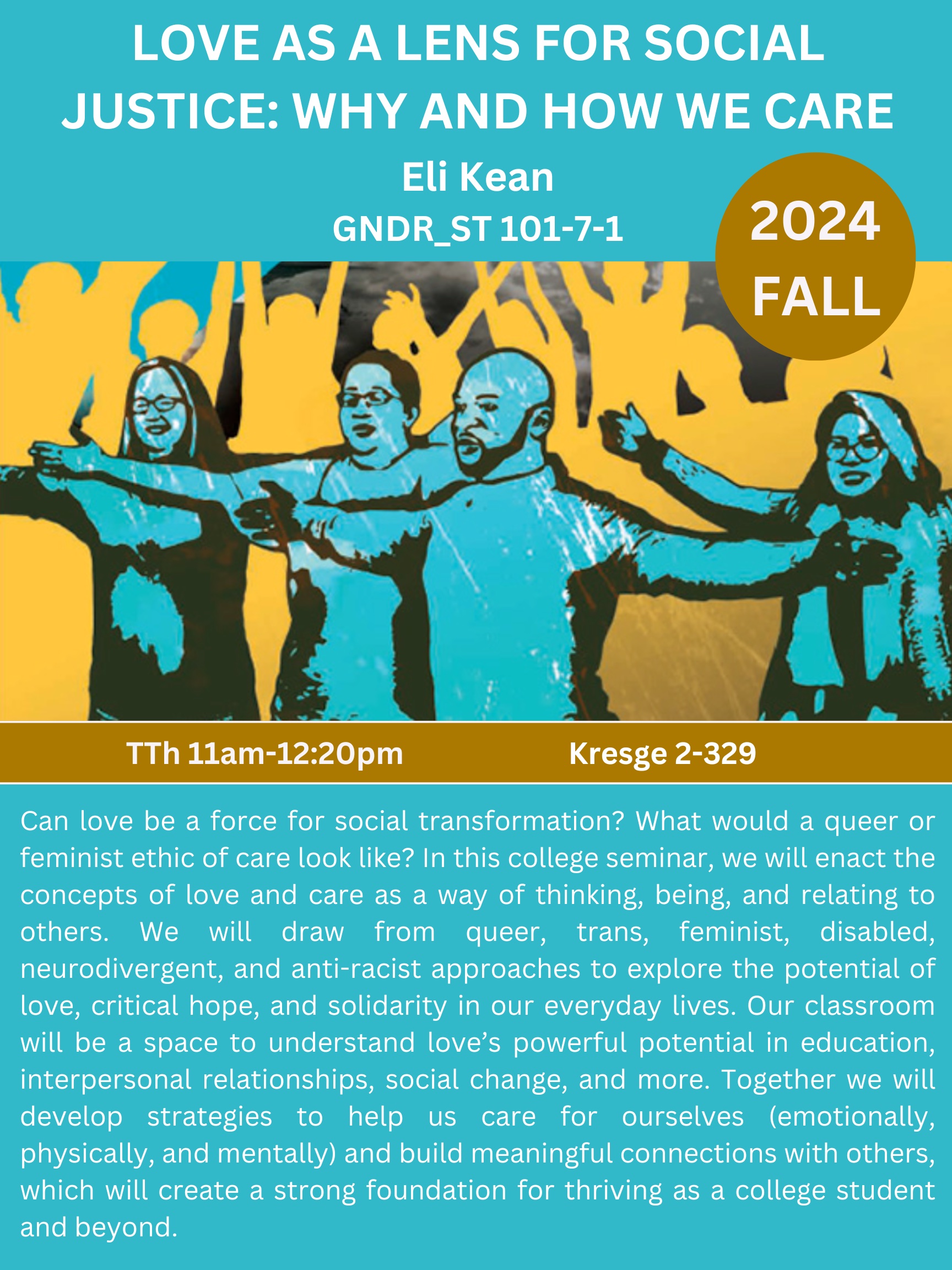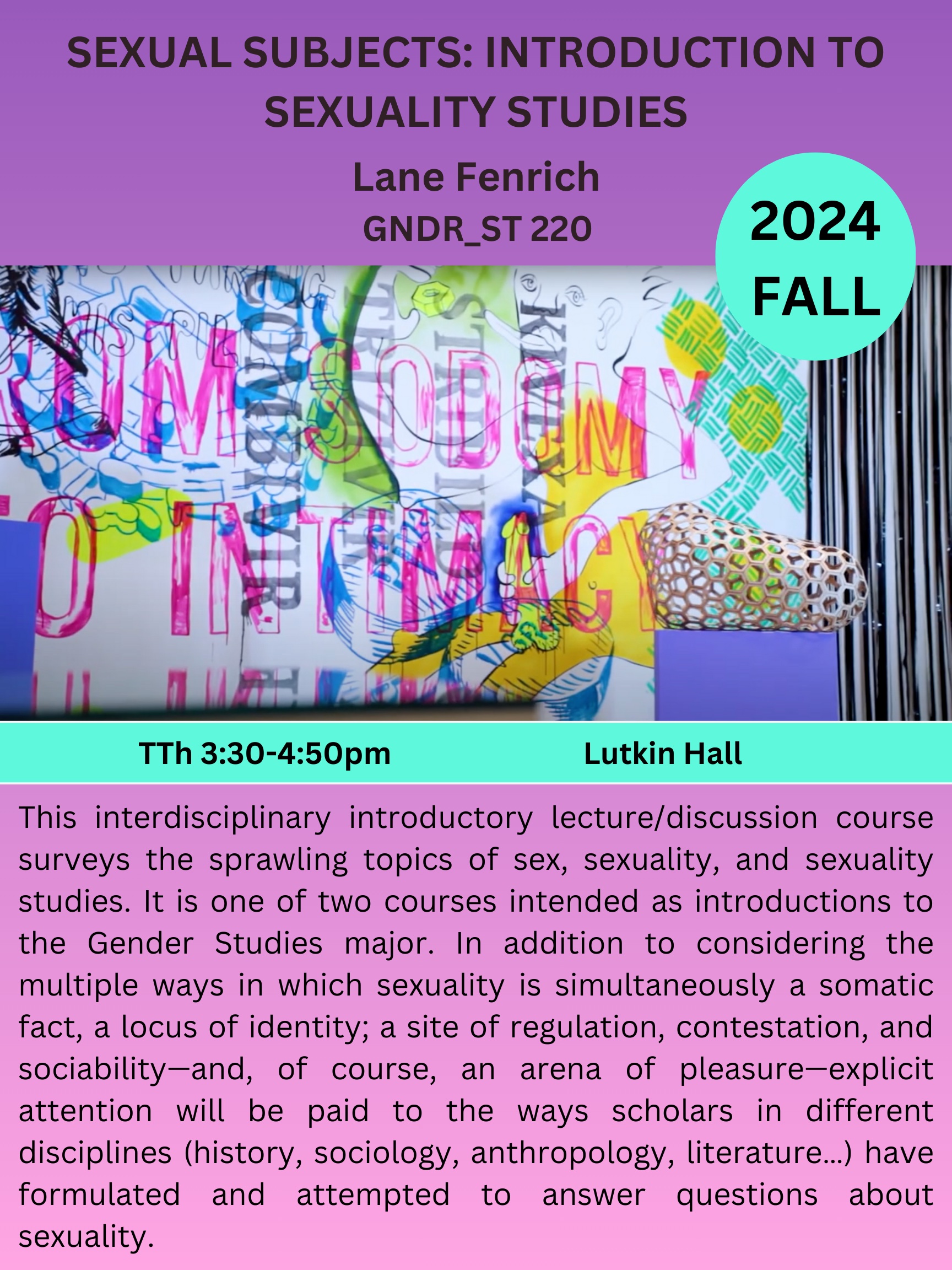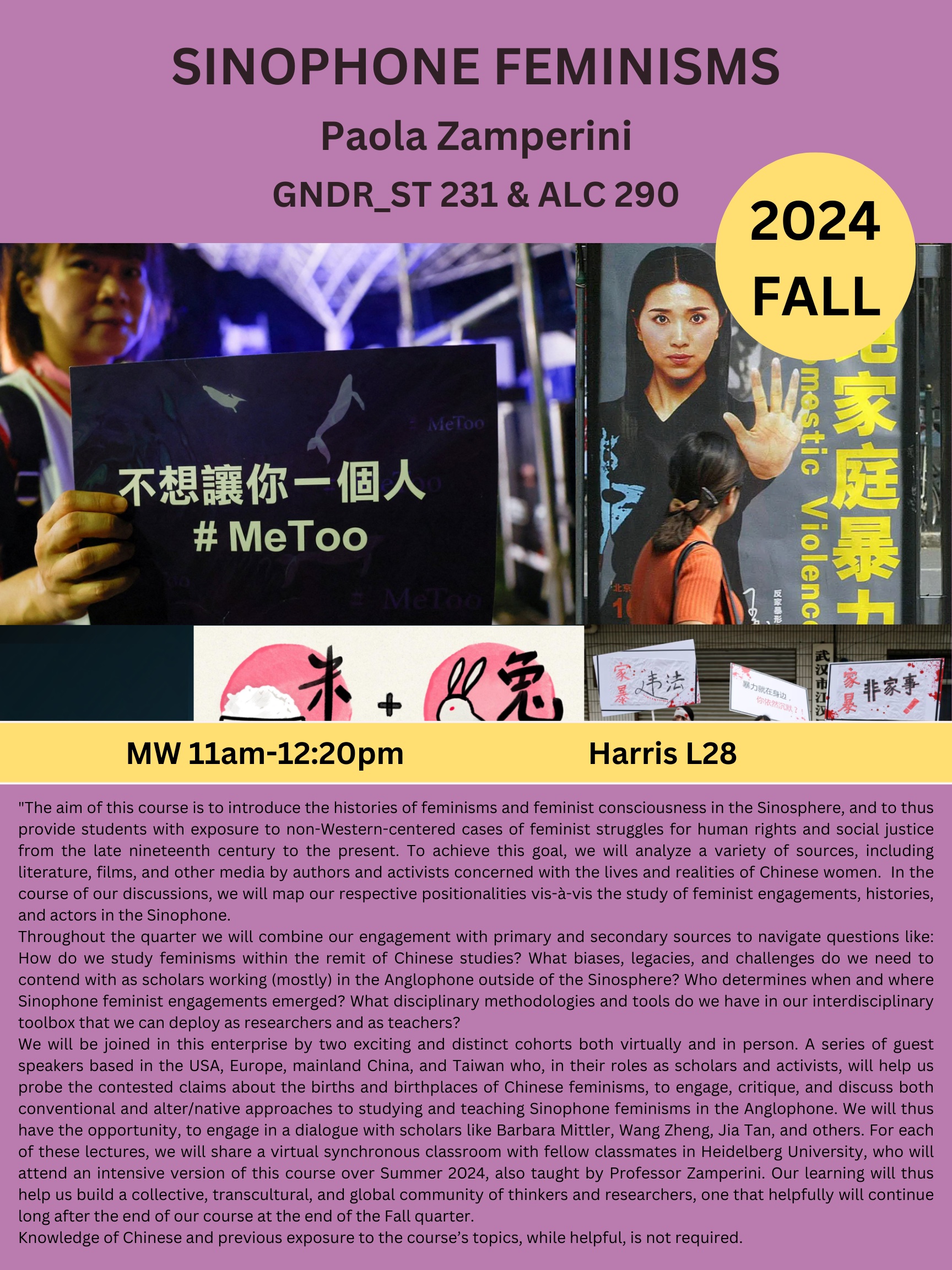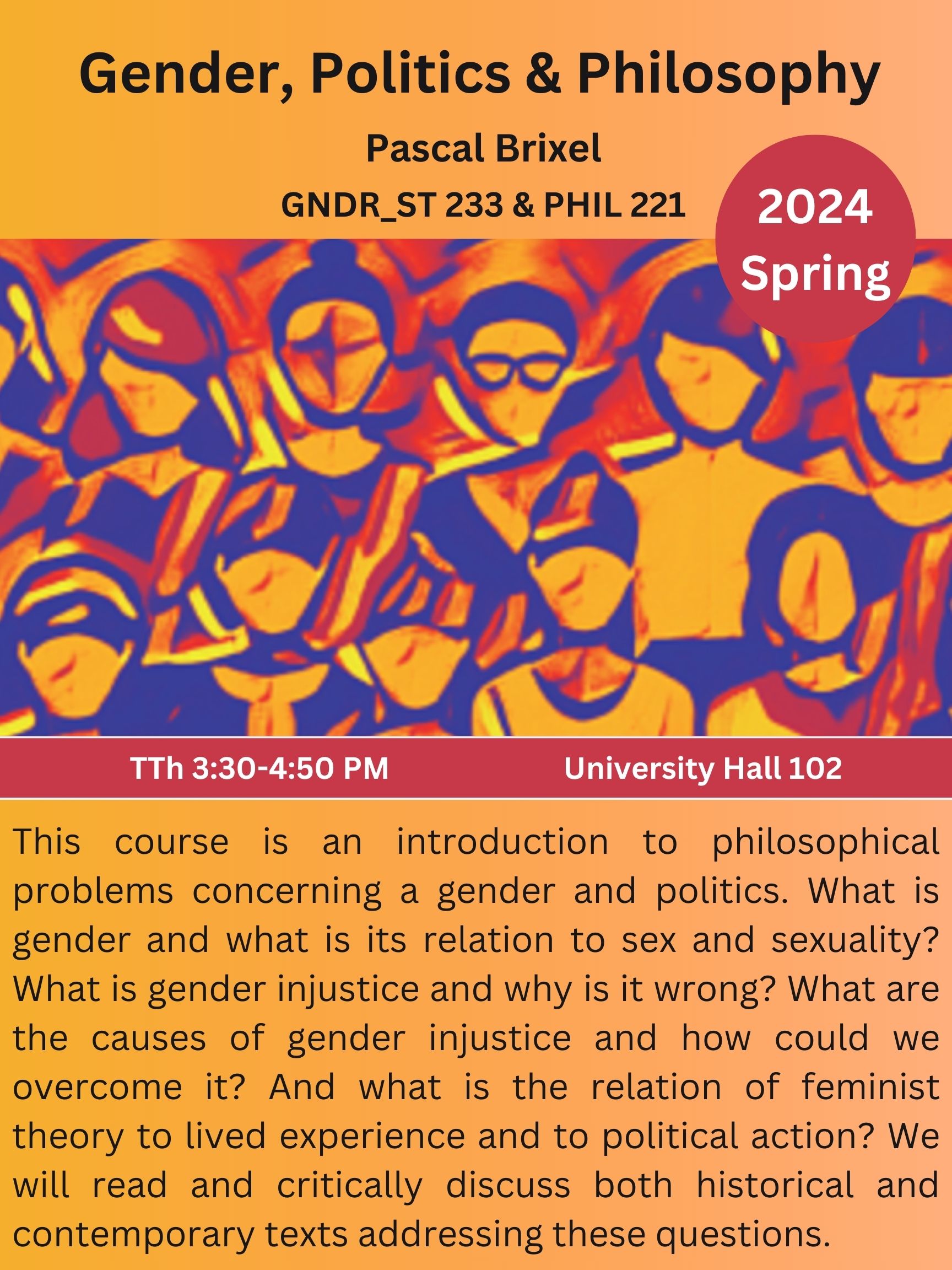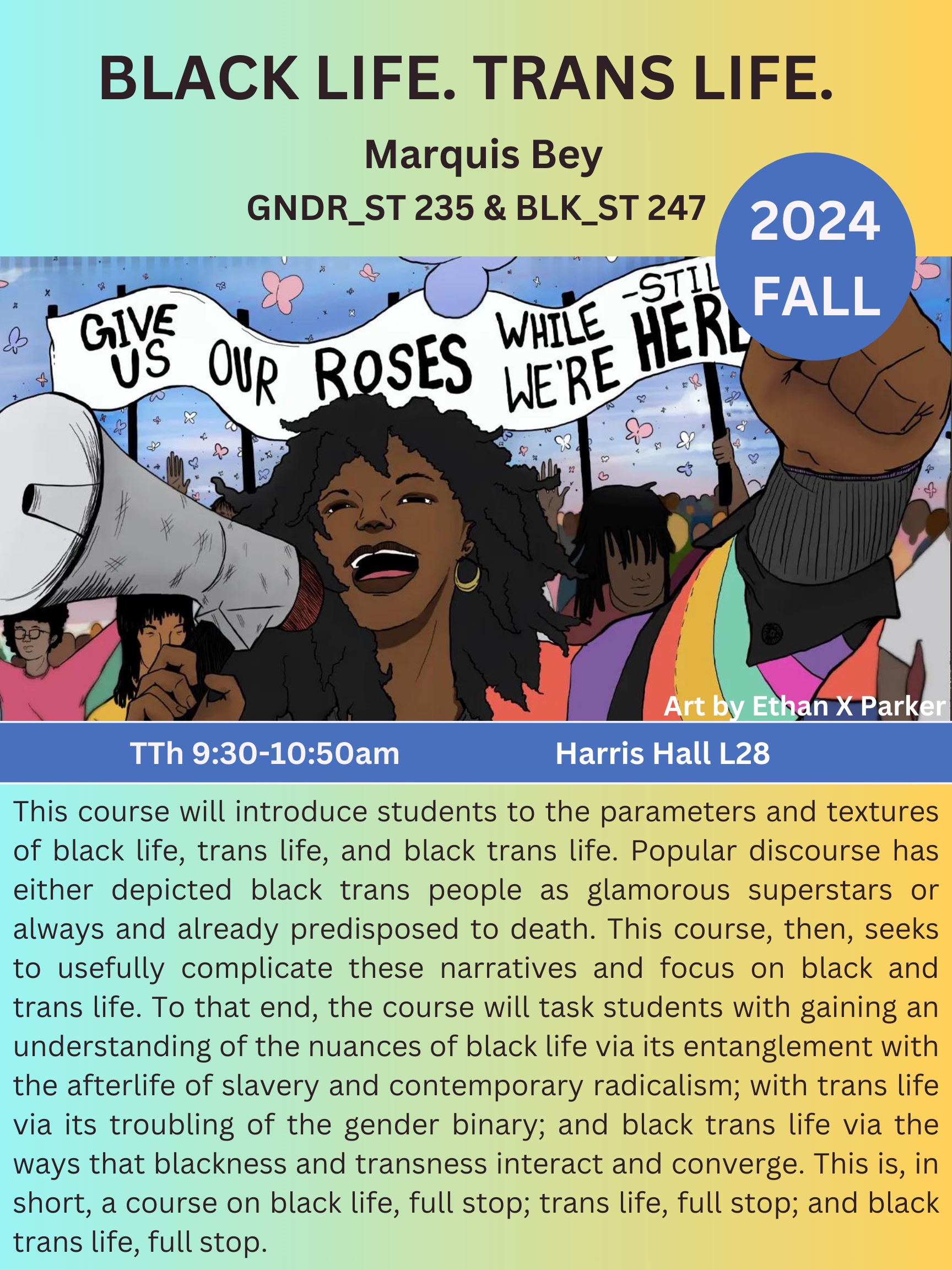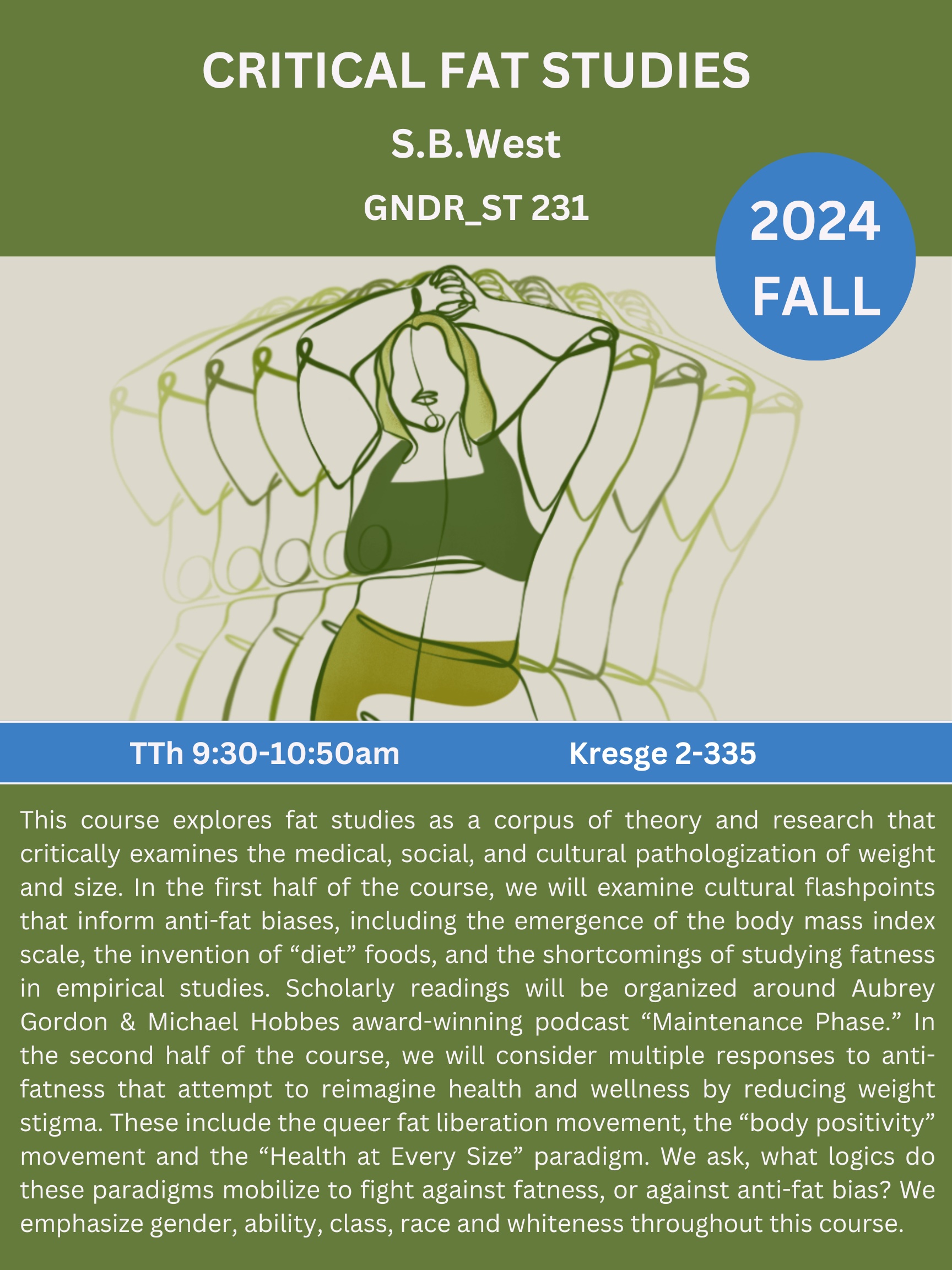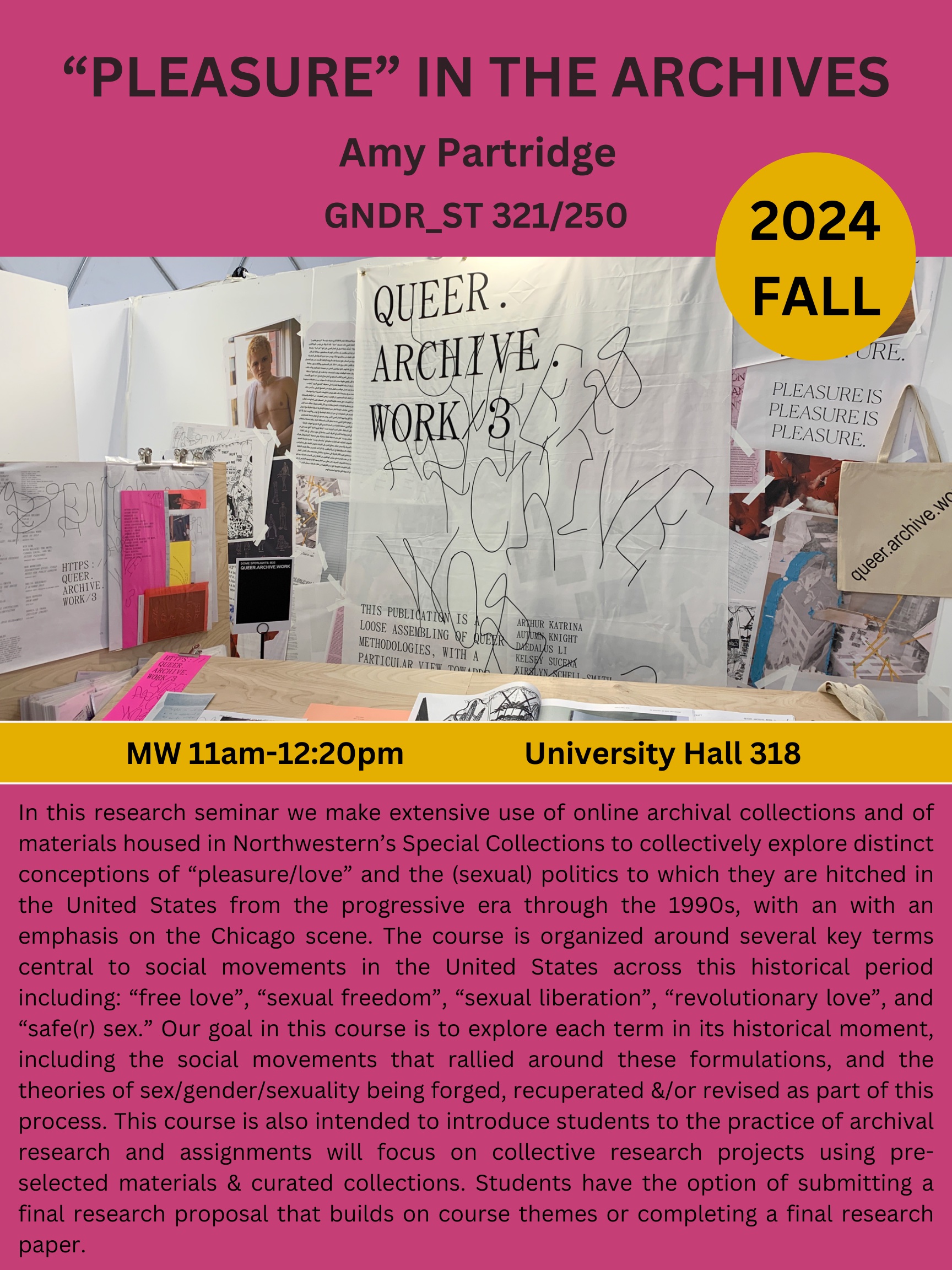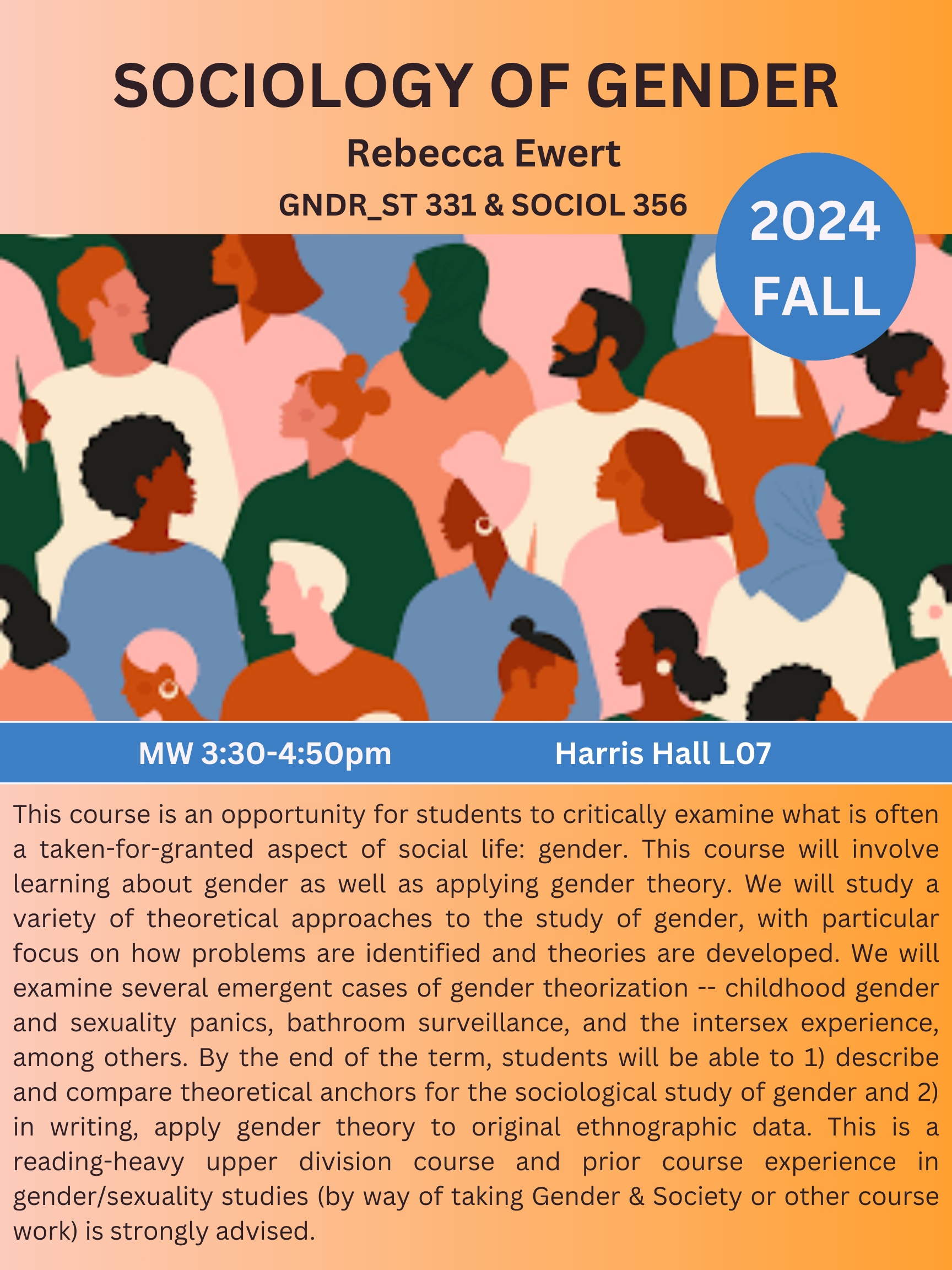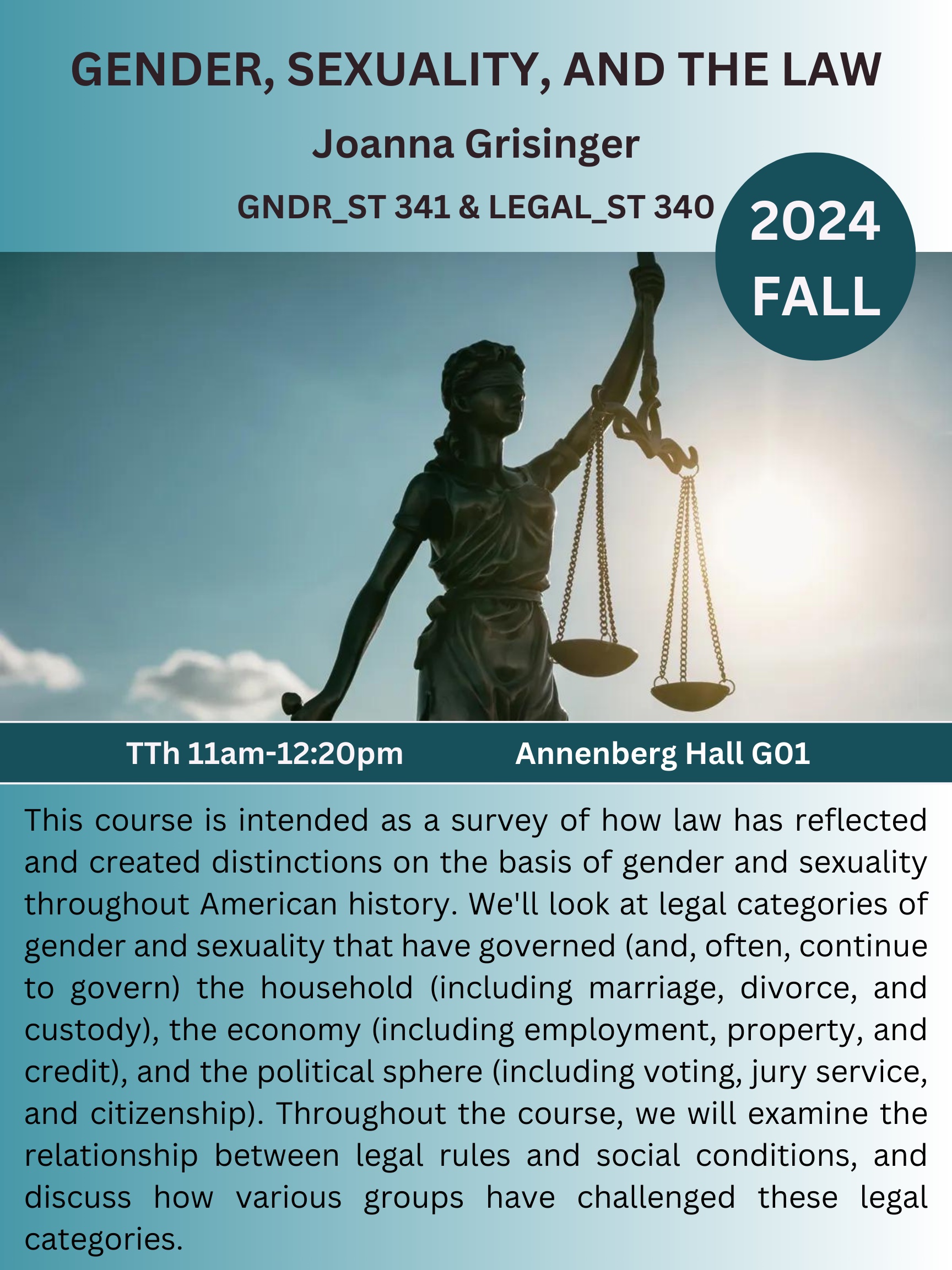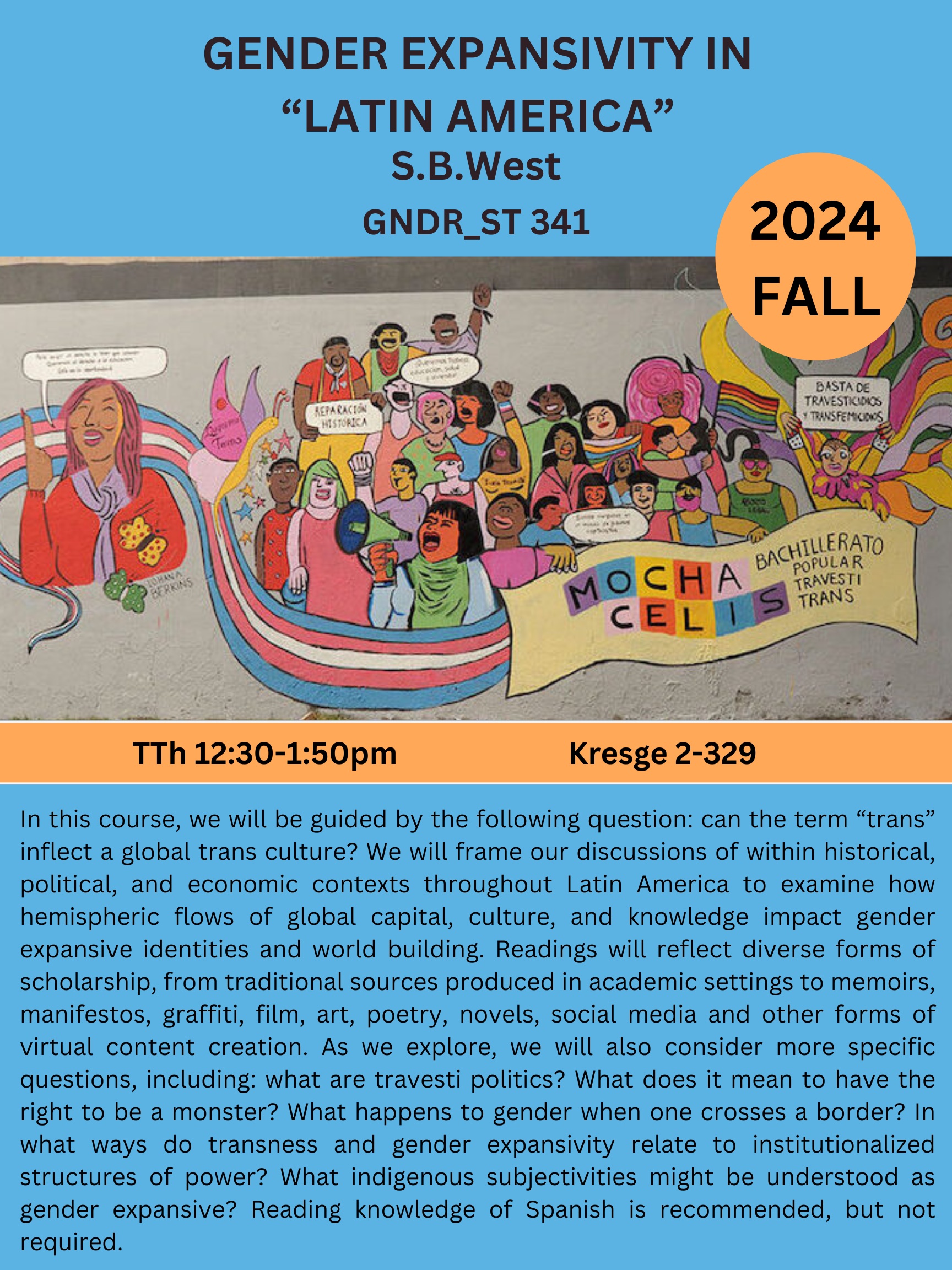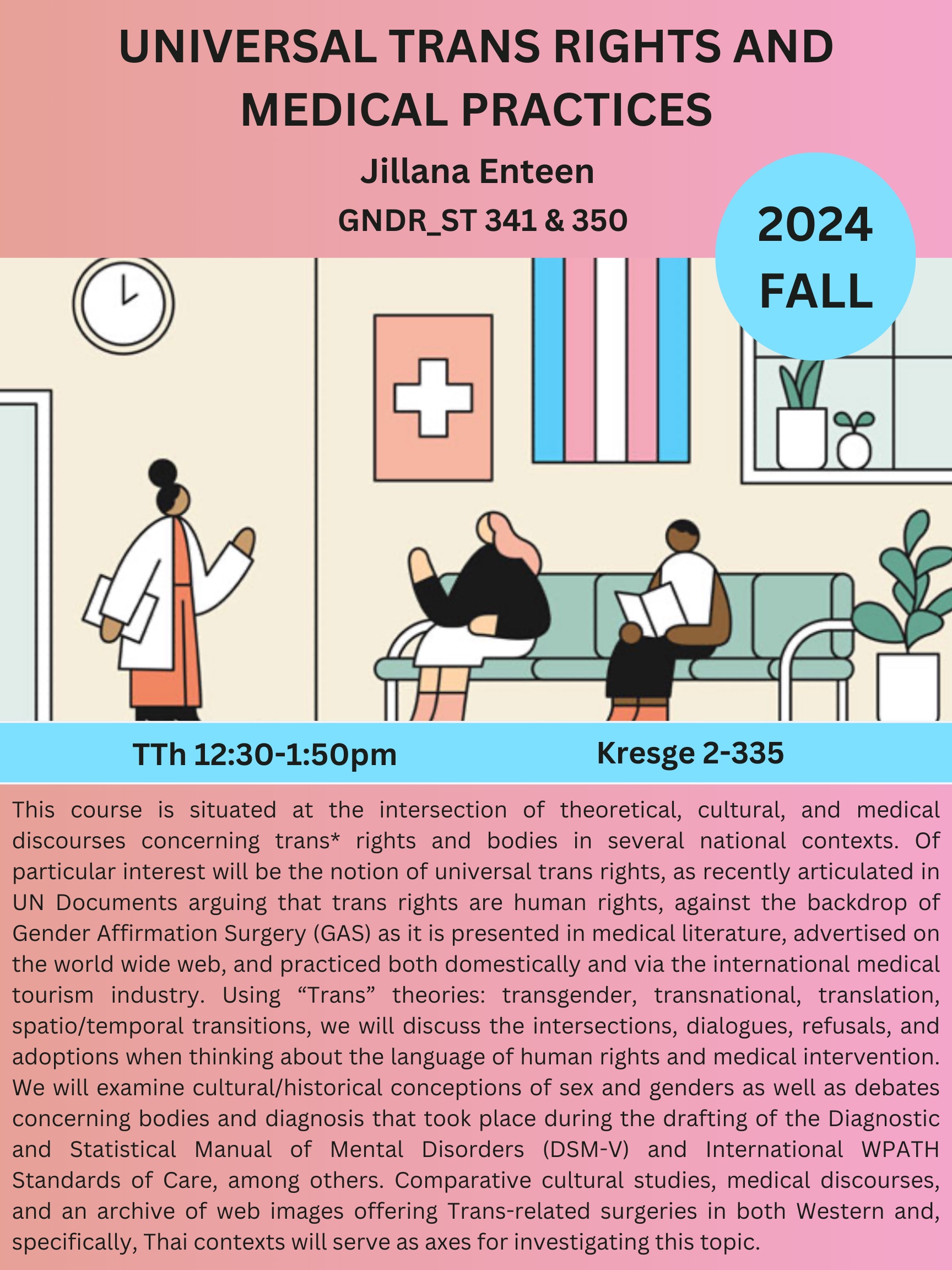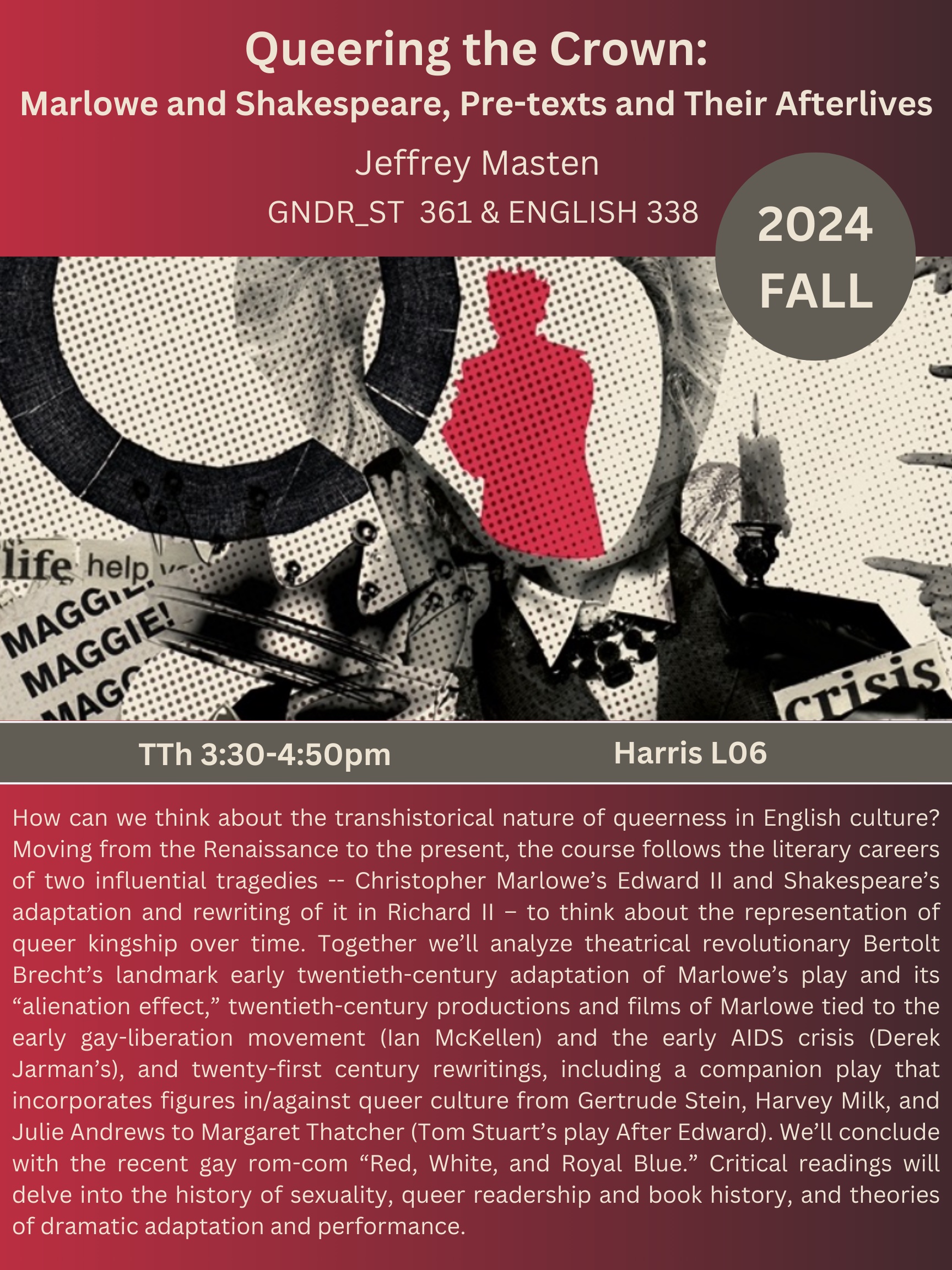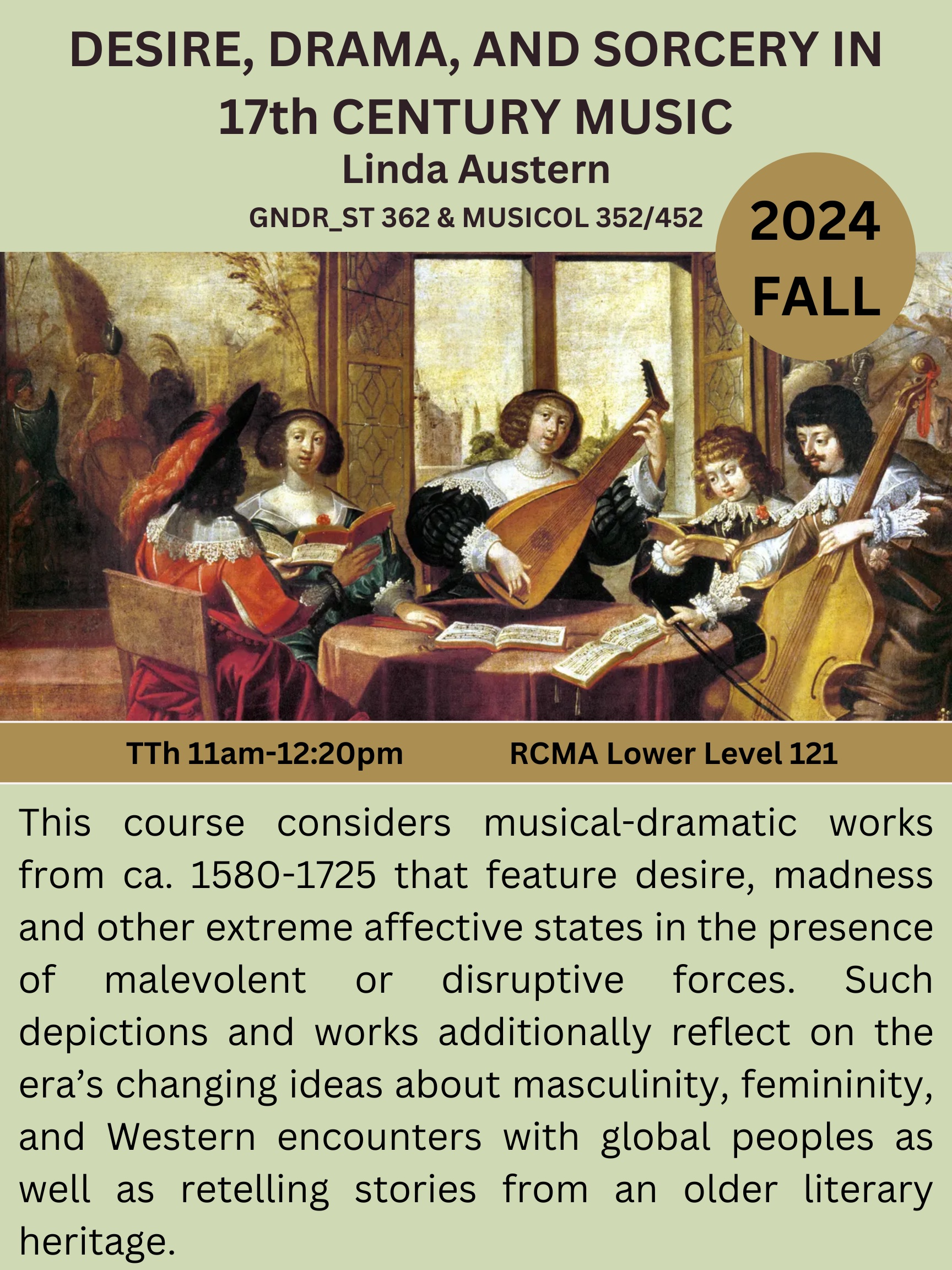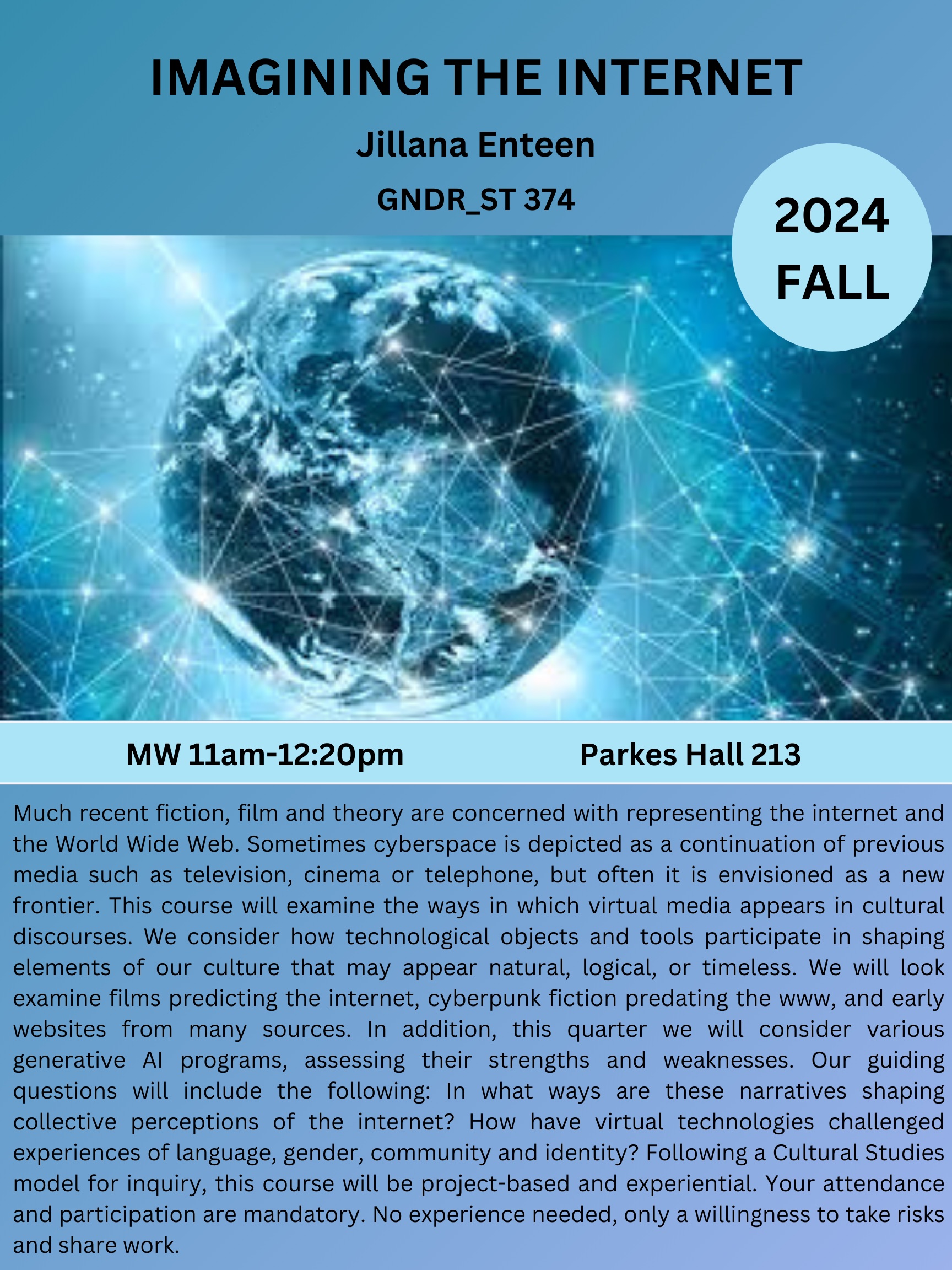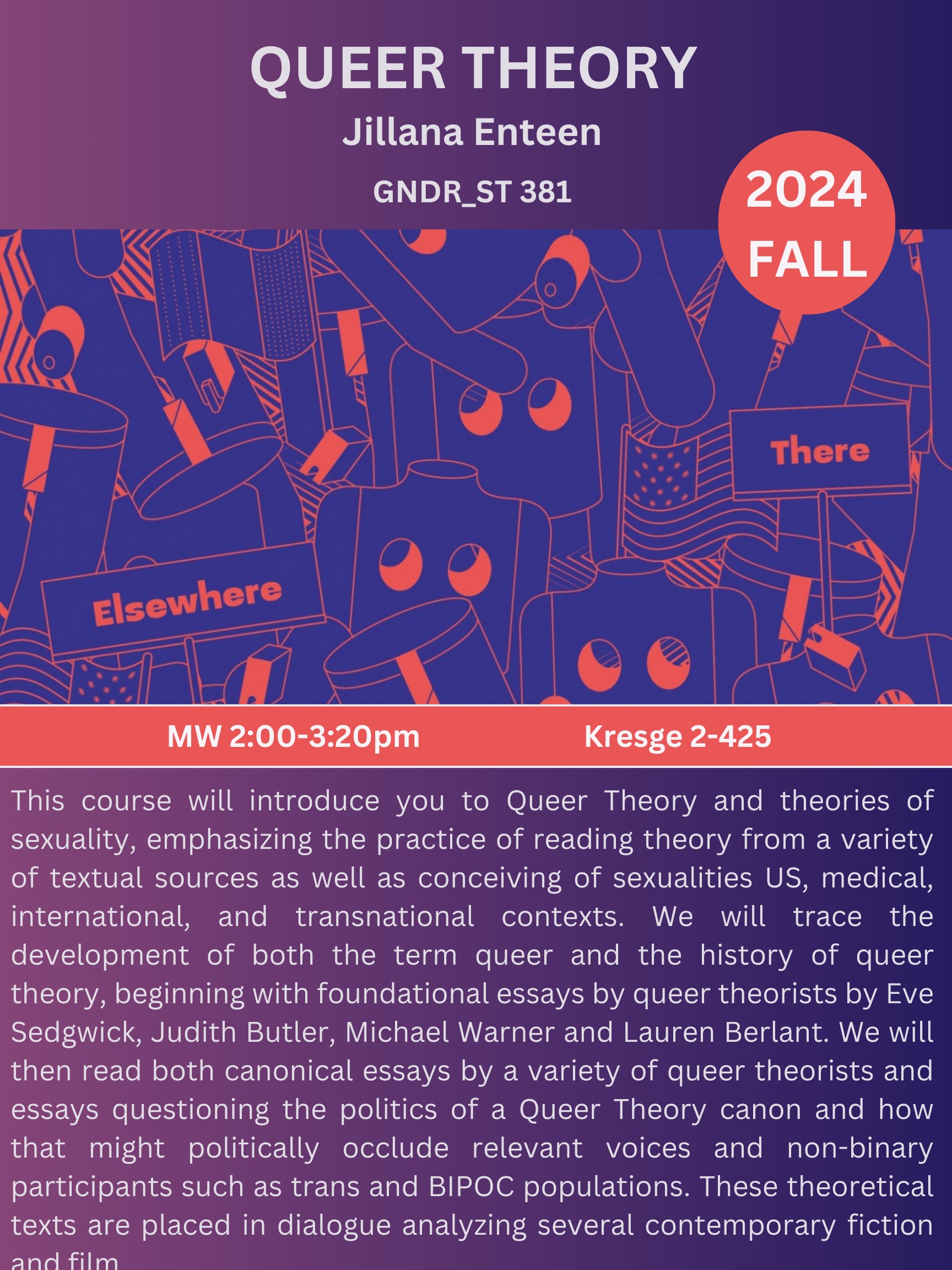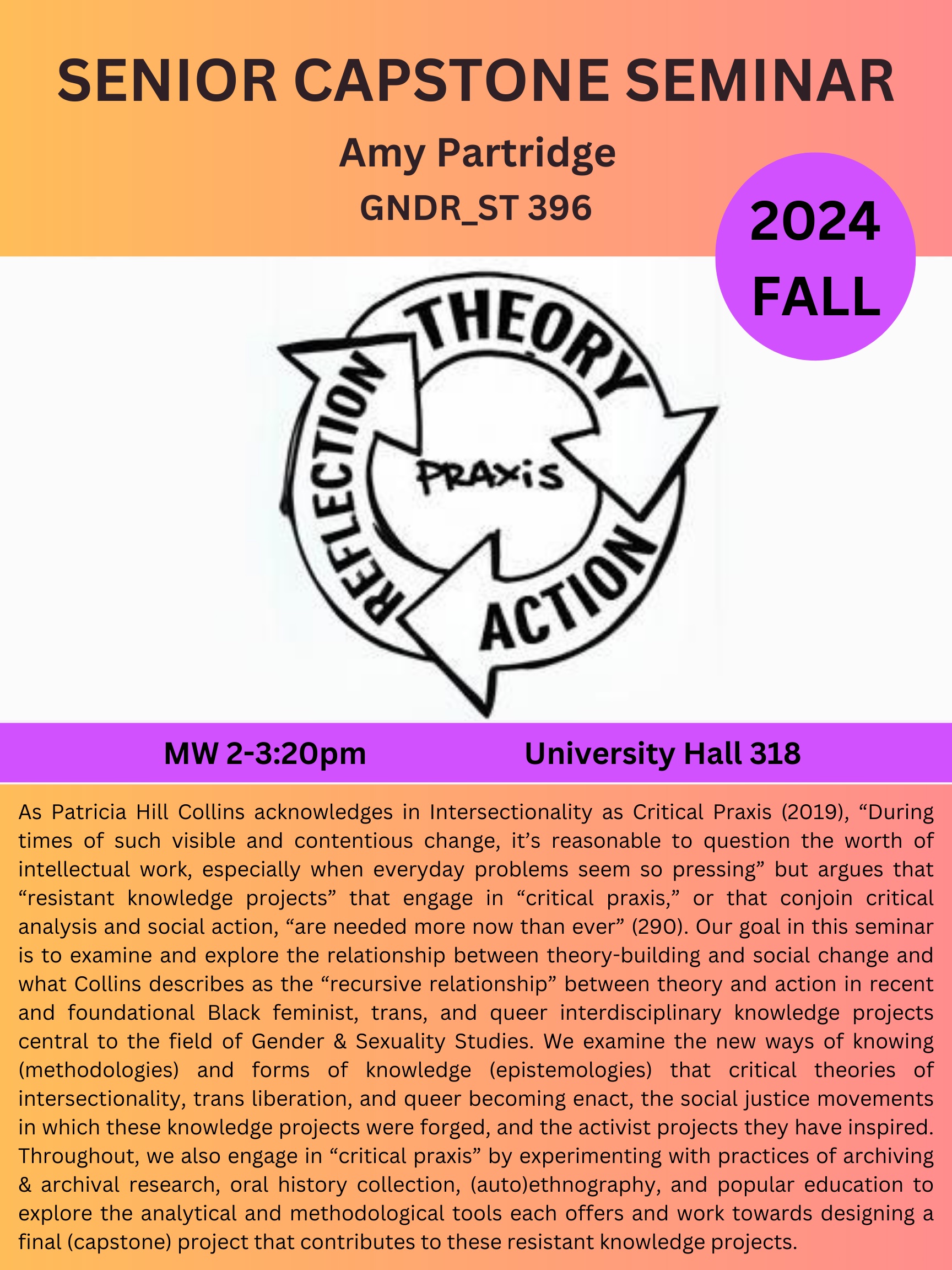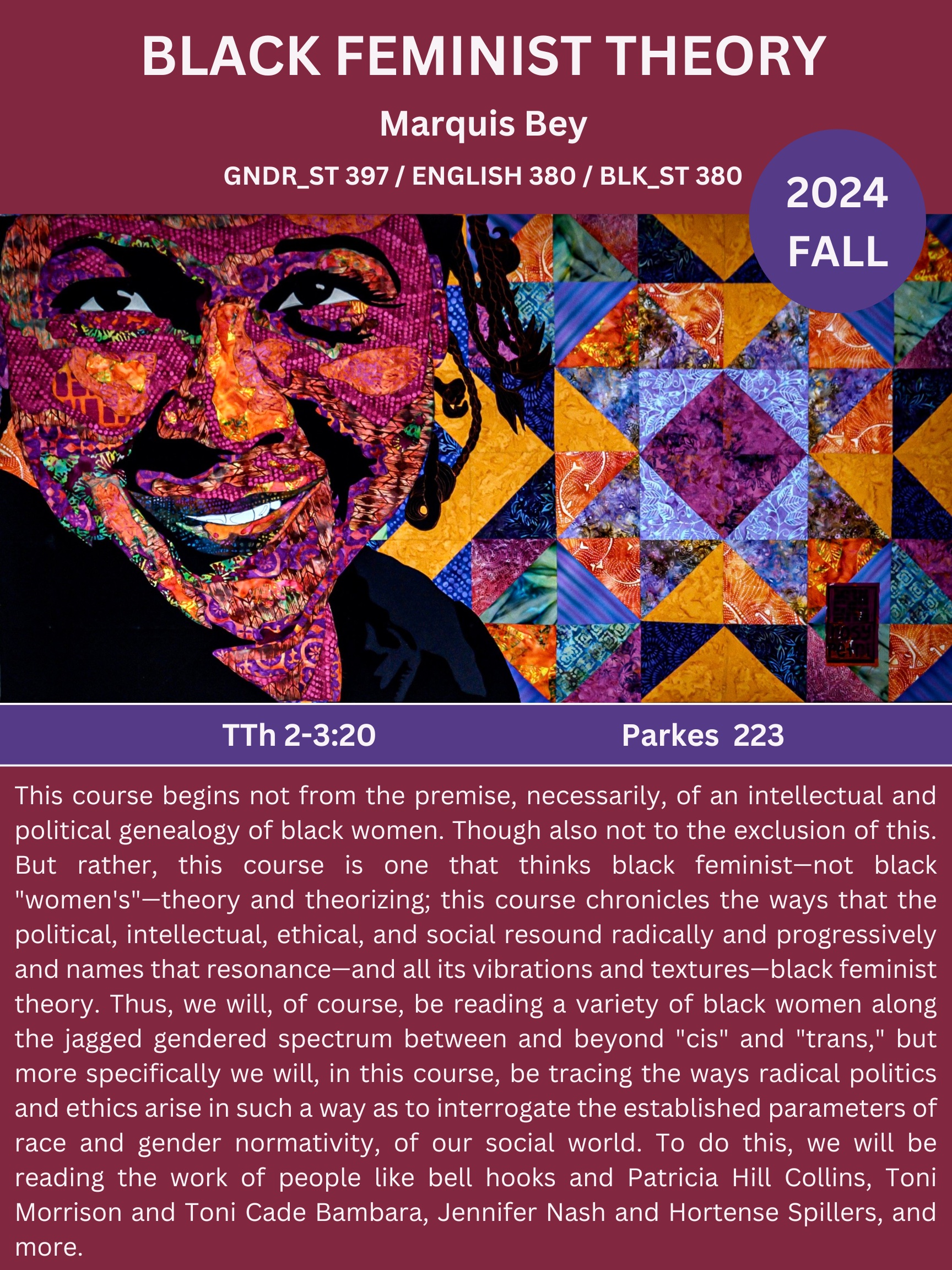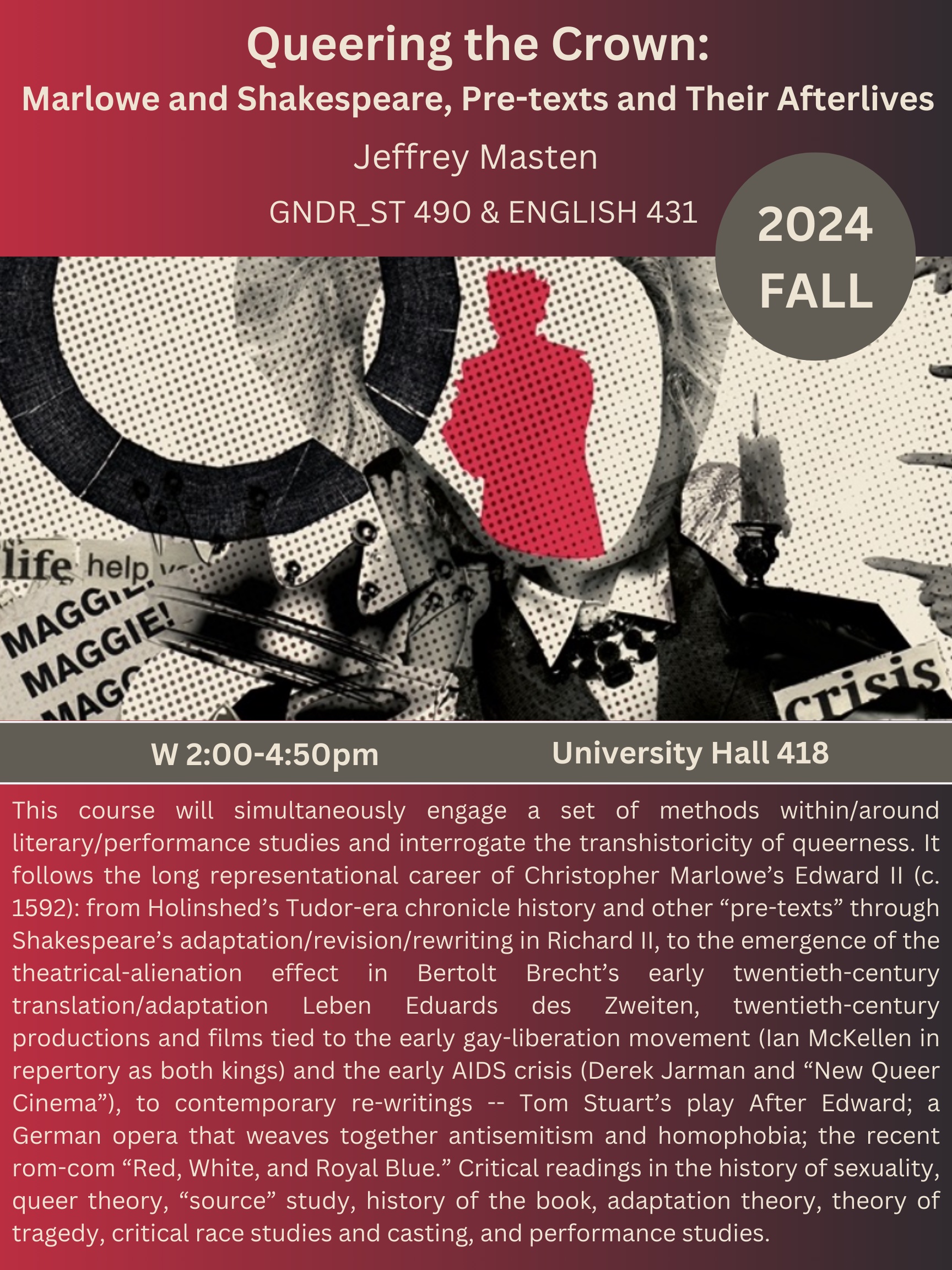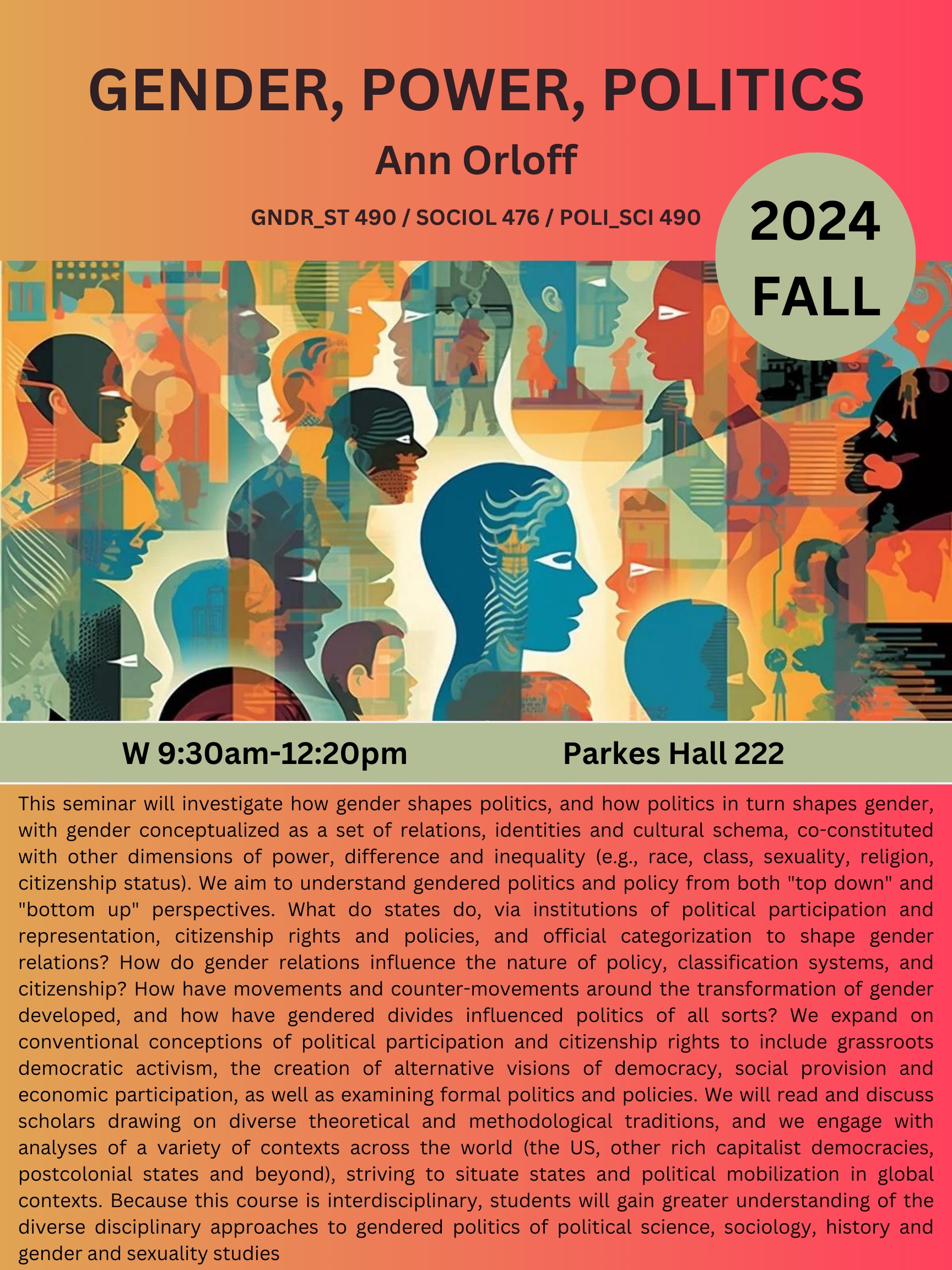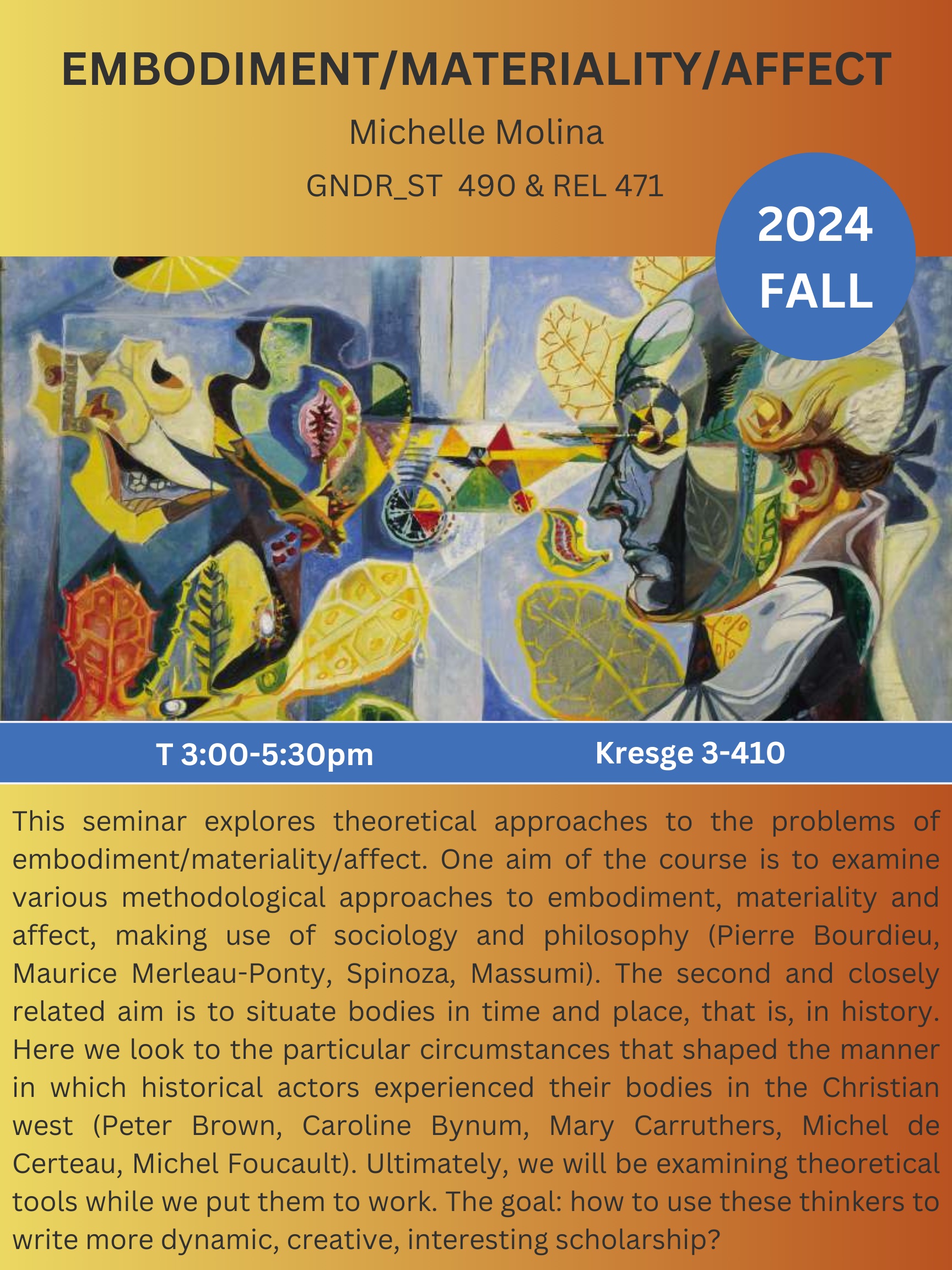2024-25 Course Descriptions
FALL 2024 | WINTER 2025 | SPRING 2025 | SUMMER 2025
Fall 2024
Winter 2025
GNDR_ST 101-8: Millennial Gender
For good reason, we often discuss or internally experience our genders and sexualities within the terms, frames, and knowledges available to us now. When we admit that genders and sexualities are not just “inborn” or unchanging over time, many of the histories we excavate stretch back for centuries. Resisting both impulses, this course uses popular cinema in the US and around the world to assess just how much changes in our notions of gender identity and sexual desire even over short spans of time—25 years, to be exact, which is lengthy for those not yet born in 1999-2000 but just yesterday for those of us who were engaged in these conversations and self-discoveries as a new millennium started.
Students will learn that all kinds of films, from studio blockbusters to tiny independents, took unusually overt interest in changing categories and expansive experiences of gender and sexuality around the Y2K moment: the era of All About My Mother, Fight Club, Ghost Dog, Boys Don’t Cry, But I’m a Cheerleader, Election, and many other enduring touchstones. We will also investigate how evolving fields like feminism and queer theory plus burgeoning scholarship in trans studies and masculinity studies were generating vocabularies, challenging assumptions, and entering into spirited debates in the same moment. Through a combination of discussions and writing assignments, some collective and some self-determined, students will gain valuable skills (how to close-read a movie, how to engage a scholarly article) and also engage in a quarter-long, inquisitive, respectful, and hopefully surprising conversation about the recent past, fluid present, and possible futures of gender and sexuality, on and off screen.
GNDR_ST 230: Traditions in Feminist Thought
This course is a rigorous introduction to feminisms’ multiple intellectual and political traditions and genealogies within and outside the US and the Western world, at different historical junctures. The course emphasizes the rich debates that have been staged within feminisms as feminists have labored to imagine other worlds in a variety of media and contexts. Our task will be to understand how these varied feminist traditions have interrogated the same sites – marriage and family, sexuality, reproduction, the nation and the state, work, liberation, and feminism itself – in radically different ways, depending on the context and society. Why are these themes or problems the key areas that feminist theorists have focused on across time and cultural divides? How have feminists around the world imagined these spaces as both sites of oppression and potential venues for freedom and emancipation? How can you encounter, think with, and live with feminist expressions and engagements outside the classroom?
GNDR_ST 231: Fashion Matters
This course will focus on the anthropological, cultural, historical, and social development of F/fashion, clothing, textiles, and their consumption in East Asia, past and present. Using a variety of sources, from fiction to art, from bodily modification to textile production, from legal codes to advertisements, we will study both actual garments created and worn throughout history, as well as the ways in which they inform identity markers such as class, ethnicity, nationality, and gender. Among the topics we will analyze in this sense will be hairstyles, foot-binding, plastic surgery, and, in a deeper sense, bodily practices that inform most fashion-related discourses in East Asia. We will also think through the issue of fashion design, production, and consumption as an often-contested site of modernity, especially in relationship to the issue of globalization and world-market. Thus, we will also include a discussion of international fashion designers, along with analysis of phenomena such as sweatshops.
GNDR_ST 232-0-20: Masculinities & Society
Gender studies have traditionally focused on women. Yet critical work on men and masculinities show us how people of all genders are constrained by gender expectations and assumptions. Furthermore, studies of masculinities shed light on practical questions like, why do men die earlier than women? And, why are men more likely to commit mass shootings? In recent years, the public spotlight has cast light on savory and unsavory aspects of masculinity; think about the rise of the term “toxic masculinity,” the #MeToo movement, advertisements aimed at men, and blogs commenting on the behavior of men on the reality show The Bachelorette.
In this course, we will go beyond banal statements like “men are trash” to critically ask, what role does masculinity play in social life? How is masculinity produced, and are there different ways to be masculine? This course provides students with an intensive introduction to the foundational theory and research in the field of masculinities studies. We will use an intersectional lens to study the ways in which the concept and lived experience of masculinity are shaped by economic, social, cultural, and political forces. As we study the institutions that socialize people into gender, we will examine how the gendered social order influences the way people of all genders perform masculinity as well as the ways men perceive themselves, people of other genders, and social situations. Verbally and in writing, students will develop an argument about the way contemporary masculinity is constructed and performed.
GNDR_ST 232-0-21: Sex, Gender, Sexuality
What is sex? What is gender? What is sexuality? How are they related? Are they social constructs or biological realities? Can we have one without the others? In this upper division undergraduate seminar, we will explore the interconnected nexus of sex, gender, and sexuality. The course will expose students to a range of theoretical approaches to sex, gender, and sexuality from sociology as well as other disciplines. The course will also provide students with practice applying these theories to real-life cases. Additionally, students will develop the skills to perform qualitative coding—a key method of analysis of sociological data. By the end of the course, students will have explored a research question of their choice related to sex, gender, and/or sexuality by qualitatively coding data in NVivo.
GNDR_ST 234: Language and Gender
An exploration of the role that gender plays in the language of and about men and women, focusing on gendered speech as part of social practice in local communities. Topics include identity categories and labels, gender-based slurs and ‘reclaimed epithets’ (e.g. "bitch", "slut". "brat"), gender vs. sex vs. sexuality, the contested notion of ‘political correctness’, sexist/misogynist language, and linguistic prescriptivism.
GNDR_ST 321: Capitalism and Desire: Mapping Sexualities in 19th Century Paris
“By transforming love into romance, capitalist society allows us to continue desiring.” By structuring satisfaction as ever incomplete, capitalism propels us to seek “the new, the better, and the more,” writes film scholar Todd McGowan. Testing this contention on the “psychic costs of free markets,” this class will take students to mid-nineteenth century Paris, when the modern iconic city of romance, with its elegant bridges, wide boulevards, endless fashion displays, and vibrant café life, was created in the capitalist transformation of its physical space and social relationships. Based on readings from feminist and queer theory, urban geography, sociology, art history, literature, and social history, we will use these various perspectives to study our main laboratory: the massive urban renewal projects under Baron Haussmann during the Second Empire of Napoleon III that demolished the twisted winding streets of old Paris to build a modern capital city of commerce and leisure.
Using three of Emile Zola’s novels on the “Haussmannization” of Paris, we will examine how changes in the physical structure altered the old connections between illicit sexualities and nonconforming gender practices. We will investigate how the new department stores, apartment buildings, the café-concerts, open-air promenades, and parks promoted bourgeois gender norms and sexual identities. In turn, we will ask how, with its new opportunities and deep losses, the moral economy of capitalism (its logic of production, profit taking, and social transactions) encouraged new subjectivities that ultimately reshaped both public and intimate spaces, as well as notions of pleasure and criminality. Most importantly, we will ask: what happened to love? The class combines lectures, in-class discussions, with short weekly assignments. With the guidance of the instructor, students will design and write a research paper (7 to 10 pages) reflecting on these topics.
GNDR_ST 321/350: Making Sense of the "Second Wave" of Feminism in/for the Present
As we grapple with the urgencies of the present, what are the politics (and promise) of telling more complex and nuanced stories of activism and social change? In recent years, the "second wave" of feminism (1968-1980) has increasingly been conflated with "white, middle-class feminism" and critiqued as an exclusionary form of feminist politics in contrast to the more intersectional feminist politics of the "third" and "fourth" waves of feminism. Numerous historians of the period have challenged us to reconsider this claim, which elides "feminism's deeply questioning, queer, coalitional and anti-imperialist past" and risks missing "some ways that feminist, lesbian, and queer of color and trans activists grappled hard to develop critical insights and knowledges that move us today" (Enke 2018). In this course, we will begin by exploring which projects, groups, and concerns have come to define the "second wave" (and subsequent “waves”) of feminism in the United States in our collective memory. We then turn to recent histories of the "second wave,” coupled with oral histories from movement participants, that challenge us to reconsider what counts as "feminist politics" during this period. For example, histories that focus on the formation of broad-based coalitions across and between liberation movements around issues of economic justice, reproductive rights, and the right to "self-defense" against both interpersonal and state violence during this period, challenge us to expand our conception of feminist activism. In the process, they require us to incorporate the "critical insights and knowledges" of labor and welfare rights activists, sex workers and gay liberationists, Black, Chicana, Puerto Rican and Indigenous liberation movement members as central to the feminist politics of the period. Guided student research into ongoing/current feminist projects (e.g. SisterSong Women of Color Reproductive Justice Collective, Chicago Abortion Fund, Survived&Punished, Critical Resistance, Sylvia Rivera Law Project) aid us in identifying the legacies of this historical period in feminist activism in 2025.
GNDR_ST 331: Sociology of Gender
This class will investigate how gender shapes politics and policy, and how these in turn shape gender, in the United States and other countries, situated in global context. Gender is conceptualized as a set of relations, identities and cultural schema, always constituted with other dimensions of power, difference and inequality (e.g., race, class, sexuality, religion, citizenship status). We will analyze the gendered character of citizenship, political participation and representation, social rights and economic rights. We aim to understand gendered politics and policy from both "top down" and "bottom up" perspectives. What do states do, via institutions of political participation and representation, citizenship rights and policies, to shape gender relations? How do gender relations influence the nature of policy and citizenship? How has feminism emerged as a radical challenge to the androcentrism and restricted character of the democratic public sphere? And how has anti-feminism come to be a significant dimension of politics? We expand on conventional conceptions of political participation and citizenship rights to include the grassroots democratic activism that gave birth to modern women's movements. We explore how women's political efforts have given rise to the creation of alternative visions of democracy, social provision and economic participation, as well as reshaping formal politics and policies. And, finally, we will take advantage of the fact that we are in the middle of an election to examine some of the gendered aspects of the political landscape in the contemporary United States.
GNDR_ST 332: Heath Activism
How do conceptions of "health" relate to ideological assumptions about gender, race, class, and sexuality? In this course, we will explore this question through a close examination of a range of activist movements that have attempted to challenge contemporaneous conceptions of health and models of disease. Case studies will include the 19th century birth control and eugenics movements, 1970s-era women's health movement(s) and Black Panther Party "survival (pending revolution) programs", ACT UP and AIDS activism, reproductive rights/justice movement activism, breast cancer and environmental activism, mental health activism in the era of psychopharmacology, and recent/ongoing "mutual aid" projects. In each case, we will consider how activists frame the problem, the tactics they use to mobilize a diverse group of social actors around the problem, and their success in creating a social movement that challenges contemporary medical models and the ideological assumptions that inform them. The course also introduces students to recent interdisciplinary scholarship on social movements.
GNDR_ST 361: Abolitionist Feminisms at the Border
Abolitionist politics demand sustained and nuanced critiques of world systems and an end to the ways they enact violence. To this end, to engage in abolitionist feminism is to consider assumptions around criminal punishment and carcerality, with an explicit attention to Black, Latinx, Indigenous, queer, and trans perspectives. From this vantage, this course will examine borders, both national and intimate, as one of the most violent and carceral spaces of our time. We ask, for example: What does it mean to abolish borders? What is the difference between this and open borders? Is the abolishment of ICE and other forms of border policing sufficient? Similarly, how has the social sphere adopted border logics? What do Indigenous “land back” initiatives look like under abolition? How might we “rehearse life” under current oppressive regimes as we work toward abolitionist futures?
GNDR_ST 372: Masculinities in 16th C. Opera
This course considers ways in which changing understanding of manhood, manliness, masculinity and male sexuality were reflected in music created, performed, and consumed in a variety of spaces and for a range of purposes among contrasting Western European cultures and sub-cultures during the 1500s.
GNDR_ST 380: Black Feminisms in a Francophone Context. From the Second World War to Global Anti-Blackness
What is the meaning of “Black Feminism” out of its US experience and initial theorization in the United States? How did women of African descent in Europe (France, Belgium, Switzerland), the Caribbean (Haiti, Guadeloupe, Martinique), the Indian Ocean (La Réunion, Mayotte, and the Comoros) and Africa (Senegal, Mali, Cameroon, Democratic Republic of Congo), whose cultures and political experiences were – at least partly – impacted by French and Belgium colonial legacy, forge their critiques of patriarchy, colonialism, and imperialism, racism? How did they also develop their own imagination of social justice, autonomy, and emancipation? Based on a wide range of materials and references driven by the social sciences, literature, and cinema, this course aims to introduce undergraduate students to a non-US-centered and transnational perspective on Black feminisms. The historical period will span from the early 20th century to the contemporary era. According to specific topics addressed in the class, comparative insights with the English-speaking Caribbean and Africa and women’s experiences in the Global South will also be included in the conversation and materials.
GNDR_ST 381: Queer Theory
This course will introduce you to Queer Theory and theories of sexuality, emphasizing the practice of reading theory from a variety of textual sources as well as conceiving of sexualities in local and transnational contexts. We will query the development of queer theory, beginning with work by Michel Foucault and foundational queer theorists by Eve Sedgwick, Judith Butler, Michael Warner, and Lauren Berlant. We will from standard canonical essays by a variety of queer theorists to essays questioning the politics of a Queer Theory canon and how that might politically occlude relevant voices such as trans and BIPOC contributions. Analysis focuses on textual critiques and cultural studies methodology, including several fictional texts and films. Seminar discussions require attendance and active participation. We will query how queer theory formulates racial, class, and national identities in relation to sexuality, and how it might offer politics beyond those based on identity. Most readings are done on a shared platform (Hypothesis) so students annotate, comment, and reply to each other on all assignments including class readings, midterm essay, and seminar paper.
GNDR_ST 401: Graduate Colloquium
The Gender and Sexuality Studies Graduate Colloquium is an interactive, participatory forum for graduate students in the GSS cluster and certificate programs. Activities include the circulation and discussion of work-in-progress and a workshop for pre-professional activities, meetings with faculty in the program, presentations by recent fellowship recipients, and review of important publications by visiting scholars.
GNDR_ST 490-0-20: Queer Theory
The central concerns of this graduate seminar are to familiarize students with critical issues, methods, and practices of Queer Theory. Our readings include foundational/early texts naming and/or refusing the topic/discipline itself as well as the way in which the practices of “reading queerly” occur in not only what we recognize as theory, but also fiction and film. We will examine and discuss critiques of the Queer Theory canons and work together to create a more relevant, inclusive lineage that considers BIPOC voices, trans theory, critical race theory, diasporic, and transnational texts that supplement the too often white, US-centric field of inquiry. Students will be expected to read carefully and critically, interrogate and analyze the complex intersections of sexualities through cultural and sociopolitical analysis that incorporate gender, race, economic and access disparities and other dimensions reflecting contemporary queer concerns broadly conceived. Close reading will be the primary methodology practiced through class readings and writing, and by the quarter’s conclusion, students will create reading lists or possible syllabi they might consider teaching in the future. In addition to this discipline-specific reading list, students will be expected to actively participate in class discussions including leading, singly or in groups, a section of a course meeting. Writing requirements consist of one short close-reading paper and a quarter-long project culminating in a 12–15-page seminar paper on a topic of their choice that demonstrates the production of queer theory from a first-person perspective.
GNDR_ST 490-0-22: Knowledge & Politics
This course will explore how scholars represent states reproducing, maintaining, or destroying a particular body politic. In doing so we will engage theories of "biopolitics" and "biopower," broadly conceived. The objective is to understand the uses and disadvantages of Michel Foucault's critiques of discourses of sovereignty for analyzing current political conflicts situated in practices of the nation, race, class, and the family, as well as the subject positions associated with these, e.g., citizens, immigrants, Whites, Asians, rich, poor the 1%, dependents, women, men, LGBT, queer, and many more. The course will attend to the intellectual and political history informing Foucault's critiques of, and elaborations on, the discourse of sovereignty, including legal discourses. During class meetings we will discuss Foucault's historical periodizations of changing discourses of power/knowledge relations associated with biopolitics and evaluate the metanarrative that informs his heuristics. Lectures will discuss the readings in the context of Foucault's own intellectual history. The class will read extensively from works by Foucault as well as texts by Giorgio Agamben, Judith Butler, Nancy Fraser, Bruno Perreau, Jacques Rancière, Ann Stoler, and others. Students are encouraged to reflect on how the readings are in conversation with their own research interests and highlight these in class
GNDR_ST 490-0-23: Masculinities in 16th C. Opera
This course considers ways in which changing understanding of manhood, manliness, masculinity and male sexuality were reflected in music created, performed, and consumed in a variety of spaces and for a range of purposes among contrasting Western European cultures and sub-cultures during the 1500s.
Spring 2025
GNDR_ST 101-8-1: Coalition Politics from Chicago and Beyond
Coalitional Politics--Case studies from Chicago and beyond: archiving the past for the present. In this seminar, we explore several 1970s-era projects in Chicago and beyond that exemplify a coalitional feminist politics and consider the usefulness of this history in an increasingly polarized present. We will read histories of this period and memoirs by movement participants, but our focus will be on engaging in collective archival research and, ultimately curating collections of (10-12) documents that aid us in recuperating these instances of successful coalition building across movements, as well as the intersectional politics that informed these collaborative projects. The seminar will introduce students to the practice of archival research as well as the remarkable range of archival materials housed in Special Collections, which might form the basis for research projects during your four years at Northwestern. Our final class project will be to collectively curate an online exhibition of our findings. Over the course of the quarter, we will also host several class visitors to explore current coalitions and projects that build on this legacy.
Cases include: Gay liberation and lesbian/feminism in Chicago; Chicago’s “Rainbow Coalition” and the People’s Revolutionary Constitutional Convention; Welfare rights and the National Welfare Rights Organization (NWRO); Reproductive rights: Clergy Consultation Service and the Jane Collective; Chicago free clinics/health projects: Black Panther Party, Young Lords Organization, Rising Up Angry, Chicago Women’s Liberation Union & Chicago Women’s Health Center.
GNDR_ST 221: Beyond Porn: Sexuality, Health and Pleasure
Threesomes. Squirting. Vibrators. Butt plugs. Multiple orgasms. You may have seen them in pornography, but have you ever wanted to study and talk about sex, and specifically, how to have a satisfying sex life? Many people look to pornography not just for entertainment, but also for education about what satisfying sexual encounters look like. Unfortunately, much of what people learn from pornography doesn’t lead them to healthy and satisfying sexual encounters and relationships. This lecture class isn’t actually about pornography. It goes beyond many presumptions about sex and pleasure depicted in pornography, the media, and popular culture, in order to equip students with information that can lead to more satisfying and healthy sexual experiences across their lifespan, regardless of how they identify, or who or what they like. The course also familiarizes students with a wide spectrum of human identities, practices, and attitudes towards sex and sexuality. The course includes lectures from guest speakers with particular expertise or experience in topics covered. Possible topics covered include: physiological and biological sex; gender; sexual orientation; homophobia and heterosexism; navigating sexual risks in a sex-positive way; sexual health disparities; sexual desire, arousal, and response; solitary sex & sex with others; sex toys; unconventional sexual practices; intimacy and effective communication; sexuality & aging; sexuality, disability & intimacy; sexual problems and solutions; sexual harassment and violence; selling sex; and hallmarks of great relationships; race, gender & sexuality, and yes, dotted through the quarter are some references to pornography.
GNDR_ST 321: Gender, Race and the Holocaust
The aim of this seminar is to introduce students to the history and historiography of race and gender during the Holocaust. As with many historical events, race and gender interacted dynamically and created the context of Nazi-occupied Europe – a place where Jewish men and women suffered in particular ways, German men and women participated in particular ways, and other racial groups – men and women alike – were targeted, collaborated, resisted, and rescued. We will read a variety of texts that explore the influences that shaped people’s behaviors and responses during the Holocaust. Antisemitism sat directly in the center of the Nazi world view. Once the Nazis got into power, they sought to translate ideology into policy. Still, their racial policies evolved over time, spurred by opportunism, innovation, and war. And too, Jewish men and women responded to the Nazi onslaught in ways similar and divergent. Sexism was also an important aspect of the Nazi perspective. While they embraced an anti-feminist stance, the Nazis nevertheless sought to incorporate “German” women into the national community and women participated actively in the implementation of Nazi racial policies. This course serves as an introduction, but some general knowledge of Holocaust history is assumed. For the purpose of dynamic engagement, the class will be comprised of reading, writing, discussion, and a final portfolio. The success of the course depends on the participation and enthusiasm of all.
GNDR_ST 324: US Gay and Lesbian History
This course explores the history of homosexuality as a legible social and cultural category; of lgbt individuals and communities as self-aware social and political actors; and of lgbt/anti-lgbt politics as arenas in which modern Americans have debated fundamental questions about human rights, personal autonomy, and citizenship. We will map the frameworks within which individuals have sought out, enjoyed, and understood sexual activity with others of the same sex; trace the growth of gay and lesbian communities over the course of the twentieth century; and survey the dramatic shifts and turns from the emergence of an organized gay and lesbian political movement to the traumas of the AIDS epidemic and the increasingly bitter fights over lgbtq citizenship and personhood of the last few decades.
GNDR_ST 327: Language and Sexuality
This course will explore the ways in which language is used to construct, negotiate, present, and/or conceal the sexual identity/ies and orientation/s of its speakers. The approach to the course will be primarily linguistic; we will investigate various aspects of language as used by members of various sexual identies, focusing on the language of and about gay men and lesbians. Among the topics to be covered will be “reclaimed epithets” (e.g. "dyke" and "queer"), gender vs. sexuality vs. sex, coming-out stories as gay genre, the sexual lexicon, cross-cultural sexual diversity, and the general role of language in creating, reifying, and reproducing sexual categories, identities, and intimacy.
GNDR_ST 331: Stigmatized Sexualities
From abstinence-only sex education programs to the public response to songs like WAP by Cardi B & Megan thee Stallion, we are bombarded with messaging that sexuality is stigmatized. But why is sexuality so taboo? How do social forces shape the way we view, experience, and regulate sexuality? Using a sociological lens, this course explores the intersection of sexuality and stigma. We will begin by exploring foundational theories of both stigma and sexuality in the social sciences. Armed with these frameworks, we will then engage with in-depth case studies of different stigmatized sexualities, including homosexuality & bisexuality, asexuality, HIV/AIDS, infidelity, sex work, kink, ethical non-monogamy, and disabled sexualities. The course will empower students to interrogate their own assumptions and to critically examine the forces that perpetuate sexual inequality in society. By the end of the course, students will have gained a deeper understanding of how stigma operates at both the individual and structural level. The final assignment requires students to write a proposal for a research project that would answer a sociological question of their choice about stigma and sexuality.
GNDR_ST 332-0-20: Gender, Health and Medicine
In this course, we will examine how the Western medical system and accompanying health practices impact people of different genders, as well as how healthcare as an institution and practice produces gender categories. Using interdisciplinary research with a focus on sociological studies, we will interrogate the social, institutional, and biological links between gender and health. We will discuss health inequalities between women, men, and trans* people from different race, ethnic, and class backgrounds, using sociological research to understand why these inequalities and forms of difference emerge and are sustained. We will explore how modern Western medicine views male and female bodies and defines their health and illnesses accordingly. Students will complete two short research projects over the term in which they use different data sources (interviews and media content) to examine gendered perceptions of health, health behaviors, help-seeking behaviors, and experiences with medical institutions.
GNDR_ST 332-0-21: Reproductive Health/Justice/Politics
As feminist scholar Michelle Murphy points out, "reproduction is not self-evidently a capacity located in sexed bodies"; it is instead a site (or formation) that joins, "cells, protocols, bodies, nations, capital, economics, freedom, and affect as much as sex and women into its sprawl." Thus, she reminds us, "how we constitute reproduction shapes how it can be imagined, altered and politicized." In this seminar we will explore the changing contours of "reproductive politics" from the 1960s to the present (or from the period immediately pre-Roe v Wade through the recent 2022 decision in Dobbs v Jackson Women's Health Organization) through an in-depth investigation of a range of projects and organizations that conceptually reimagine what we mean by "reproduction," the scope and content of "reproductive politics," and the kinds of demands that can be made in the name of reproductive health, rights, freedom and justice.
GNDR_ST 341: Women Uprising: Thinking with Transnational Feminisms
In an age of climate disasters, detention and deportations, ever expanding settler colonization, and neo-imperialist warfare, what does mean to be a feminist? Can one act feminist without reckoning with questions of race, capital, and the nation-state? Is the “transnational civil society” an agent for real liberation, or merely the latest iteration of the White Savior self-imagination? To answer these questions, this course will trace diverse voices for women’s liberation across the globe, from the beginning of modernity through the contemporary age. From independence fighters in colonial India to the 2022 “Woman Life Freedom” protests in Iran, from 20th-century communist and anarchists revolutionaries to queer activists in China today, from past pan-Africanist visionaries to indigenous activists resisting ongoing expropriation, we will encounter women resisting simultaneously forces of local patriarchy and Western intervention. We will see how ideas of social justice, struggles for political autonomy, and women’s liberation intertwine and travel across borders, and we will explore how transnational solidarities grow and engender new revolutionary aspirations.
GNDR_ST 350: Who's Afraid of Black Sexuality?
This course invites students into an interdisciplinary, intersectional exploration of how Black sex and sexualities are imagined, governed, and experienced in the U.S. and beyond. Through an array of critical lenses, we will investigate the ways colonial, slavocratic, antiblack, capitalist, patriarchal, and heterosexist systems have shaped dominant discourses and practices surrounding Black sexuality. In undertaking this work, we will center Black voices, bodies, and desires, exploring how Black people have navigated, resisted, and redefined these constraints to articulate their own erotic lives.
Drawing from a rich array of sources—including music, film, visual art, and performance art, as well as texts in Black feminist theory, queer of color critique, histories of sexualities, critical ethnography, and porn studies—students will engage with Black sexuality as a charged site where power, pleasure, vulnerability, and freedom intersect. By the end of the course, students will have developed tools to critically analyze representations of Black sexuality, while also considering the radical potential of Black eroticism as a space of self-expression, joy, and resistance.
GNDR_ST 361: The Poetics and Erotics of Audre Lorde
In her complementary, progressive set of essays, “Poetry Is Not a Luxury” and “Uses of the Erotic: The Erotic as Power,” Audre Lorde asserts that poetry – rather than being luxury or idle fantasy – is the “disciplined attention to the true meaning of ‘it feels right to me’” (37). Lorde defines poetry not as “sterile word play" but as “a revelatory distillation of experience” (37). Consequently, she situates the poetic in an inherent interrelation with the erotic, asserting that the erotic “is not a question only of what we do; it is a question of how acutely and fully we can feel in the doing” (54). Moving through a framework that insists on acutely and fully feeling what we do, as well as on doing and distilling what we feel in a manner that is revelatory, this course seeks to engage in Black feminist praxis – thinking alongside Lorde’s conceptualizations of poetry and the erotic – to carefully examine myriad articulations of queer Black existence and embodied experience. Throughout the quarter, we will use these two essays from Sister Outsider as a springboard from which to explore the affective, intellectual, and creative significance of acute and full queer Black feelings and revelatory distillations of experience. These interventions are meant to highlight the ways that queer Black storytellers and tellers of queer Black stories – including poets, novelists, critical theorists, filmmakers, actors, painters, and performance artists – mobilize the poetic and erotic to access and articulate new modes of queer Black being, feeling, and doing.
GNDR_ST 374: Imagining the Internet
Much recent fiction, film and theory are concerned with representing the internet and the World Wide Web. Sometimes cyberspace is depicted as a continuation of previous media such as television, cinema or telephone, but often it is envisioned as a new frontier. This course will examine the ways in which virtual media appears in cultural discourses. We consider how technological objects and tools participate in shaping elements of our culture that may appear natural, logical, or timeless. We will look examine films predicting the internet, cyberpunk fiction predating the www, and early websites from many sources. In addition, this quarter we will consider various generative AI programs, assessing their strengths and weaknesses. Our guiding questions will include the following: In what ways are these narratives shaping collective perceptions of the internet? How have virtual technologies challenged experiences of language, gender, community and identity? Following a Cultural Studies model for inquiry, this course will be project-based and experiential. Your attendance and participation are mandatory. No experience needed, only a willingness to take risks and share work.
GNDR_ST 382: Gender, Race and the Politics of Beauty
Is beauty a site of political struggle? Applying the critical frameworks developed by feminist, queer, and trans* writers and theorists, this course asks why has there been such heated disputes over beauty culture is oppressive or liberatory? Is beauty the source of delusion and false values or the source of self-expression and empowerment? Could it be a site of critical destabilizing practices? To better understand the deeper stakes in this debate, the class sets these questions historically, tracing them from 17th and 18th century moral philosophy and aesthetics to 19th century physiognomics, anthropology, medicine, phrenology, and comparative anatomy. A crucial component of this project is to uncover how elites as spectators, philosophers, connoisseurs, and scientists have constituted racial and sexual hierarchies through their aesthetic judgments of others. Through case studies on beauty pageants, cosmetic surgeries, bar and club cultures, as well as sports and modern/postmodern concert dance, we will study the counter-discourses and self-fashioning strategies of groups and individuals. Focusing on the performative and bodies in motion, we will ask whether corporeal meaning can be remade from within and by “marked” bodies. Instead of developing simple resistance models of opposition, we will focus on how communities establish their aesthetics to communicate their goals, hopes, and pain.
GNDR_ST 390: Queering Kinship: Making and Breaking "The Family"
How does family nurture and threaten queerness—and how do queers nurture and threaten the figure of “the family”? In this course we will examine the social, cultural, and political tensions between desires for sexual freedom, on one hand, and desires for kinship, on the other. Turning to contemporary queer American literature as our guide, and drawing inspiration from discussions within feminist, queer, and critical race theory, we will investigate the similarities and differences between heteronormative, privatized forms of intimate relation and alternative, queer modes of mutual aid and just distribution. Taking a cue from writer Maggie Nelson's memoir The Argonauts, we will ask, “When or how do new kinship systems mime older nuclear-family arrangements, and when or how do they radically recontextualize them in a way that constitutes a rethinking of kinship?” Over the span of the course, we will read an array of poetry, fiction, and literary nonfiction that traces an arc from coming out (“breaking the family”) to choosing queer kin (“making the family”) and finally to abolishing the institution of the family altogether (back to “breaking the family”). At stake in our inquiry is an attempt 1) to better understand whether queer kinship ever really transcends the oppressive protocols of the family; and, perhaps most urgently, 2) to imagine practices of queer care and sustenance that might persist in an age threatening to retract freedoms concerning same-sex marriage and intimacy, queer adoption, and gender-expansive healthcare and reproductive technologies.
GNDR_ST 490-0-20: Reading Gender Otherwise: Indigenous Movements and Literature in Latin America
This course draws from a rich archive of theoretical frameworks to interrogate gender as a paradigm that mobilizes myriad forms of sociopolitical oppression. Readings during the first unit of the course will explore Latin American approaches to coloniality and the decolonial turn, with special emphasis on gender as theorized by Sylvia Wynter and PJ DiPietro, among others. In the second unit of this course, we turn to Buen Vivir philosophy. Loosely translatable as “Good Living,” Buen Vivir a key expression of Indigenous autonomy and plurinational movements throughout Abiayala (Guna Language meaning "the Americas" [lit. "continent of plenitude and maturity"]).Through the use of Indigenous methodologies, we consider: how might we interrogate gender without reproducing colonial logics? In other words, how do we read for gender while aspiring to what Catherine Walsh has called “thinking-otherwise,” with a keen eye toward what Indigenous autonomous group U jeets’el le ki’ki’ kuxtal has called the “colonization that has slipped in and deeply embedded itself in our territory, our minds, and our hearts?” We close this course by exploring the role of the text in imagining Indigenous autonomy. Spanish reading knowledge is strongly recommended for this course. Please contact instructor with questions regarding language recommendation.
GNDR_ST 490-0-22: Afrofeminists. Black Women Challenging Colorblindness in Europe
"Afrofeminism" is the label forged by a new generation of Afro-descendant women (mostly in their twenties and early thirties), born in Europe (often non-English-speaking), to define their black feminism to not only affirm their multiple African heritages while they live in Europe, but also to distinguish themselves from US Black Feminism. This triple gesture – linguistic, political, and cultural – calls for taking seriously the original formation and expressions of Black feminisms in diasporic and global contexts. It also implies analyzing the enduring consequences of colonialism of former European empires on the very soil of their metropoles through an intersectional perspective. This course will, therefore pay particular attention to the historical and social conditions of the emergence of black feminist struggles against patriarchy, racist minoritization and social inequality in a social and political context of white hegemony, where systemic racism is generally considered as "a notion imported from the United States”. The reflections and readings will focus more specifically on France, a European country paradigmatic of institutionalized race denial. Formerly a slave-owning colonial empire still marked by massive immigration of workers from Africa, the Caribbean and the Indian Ocean in the 1960s, France still maintains ambiguous political and economic ties with these territories, while it actively excludes any reference to race from its official legislation as it has made colorblindness the bedrock of its national republican ideology.
GNDR_ST 490-0-23: Queer and Transgender Studies in Religion
This seminar introduces students to the growing subfield of queer and transgender studies in religion. We will explore the norming systems of religion, gender/sex and sexuality together, examining how they produce both normative and non-normative forms of embodiment and desire. Combining theoretical frameworks from religious studies and queer and transgender studies, we will study the impact of religious norms on queer/trans lives within religious communities, queer/trans forms of religion that emerge on the margins of normative religious communities, and when queerness/transness become points of religious exit. We will consider how specific ethnoreligious communities generate their own forms of queerness and transness, and analyze how these forms of expansion and transgression are tied to specific locations, bodies and ethnoreligiosities. Crucial to our study will be the examination of the language and categories of “queer” “trans” and “religious” as social identities and structural subject positions. Where do these terms originate and who do they include? If queer/trans are defined in opposition to a social norm, how might we describe those who move between norming systems, like religious exiters, migrants and multiply racialized people? And finally, if “religious” is defined by adherence to norms, how can we describe the affiliations of queer/trans religion? Students will have the opportunity to grapple with overlapping identitarian, structural and theoretical concerns of religious studies and queer & transgender studies, charting the differences between these different forms of queerness/transness, and tracing when they do and do not link up. At a time when religious freedom and queer/trans rights are increasingly pitted against one another, we will unpack the histories and inconsistencies in these categories through a combined analysis of power, authority, embodiment and social movement.
SUMMER 2025
GNDR_ST 321: LGBTQ Activism in the U.S.
This interdisciplinary course is designed to engage with scholarship, personal narratives, and other forms of media that address key topics in LGBTQ+ activist movements in the United States. Focusing on flashpoints in the history of LGBTQ+ rights and culture, students will leave this course with a concrete sense of the lives and contributions of queer and trans people within social justice movements. Students will have opportunities to connect their personal experiences with historical and contemporary social and political issues. Together, we will utilize a critical lens to analyze the formation and evolution of LGBTQ+ activism, with an eye toward present and future efforts for cultural and political change.
GNDR_ST 372: Gender, Sexuality and Performance
This course surveys the fields of gender and sexuality studies through a focus on queer and trans of color critique as it is intertwined with performance studies. This course follows a genealogy of performance studies that has its origins in a ‘theory in the flesh’, inspired by the legacies of women of color feminisms and queer theory, as well as movement building that brings to the front questions of race, class, religion, nation, citizenship, disability and diaspora. We will examine the work of LGBTIQ theorists, activists and artists of color who challenge the inherent whiteness of mainstream queer and feminist theory, and the persistent cisheterosexism of ethnic studies, utilizing performance as a mode of research, method, theorizing and artistic expression. The course will consider how cultural products such as art, film, music, performance and other media speak to these scholarly fields and political movements and shape conceptualizations of identity, care, disease, death, disability, futurity, hope, desire and love. Course assignments include written work as well as creative projects.

